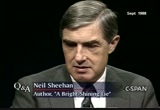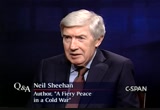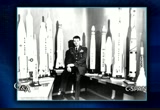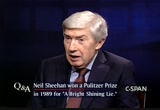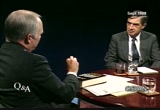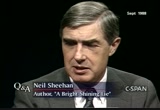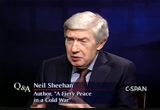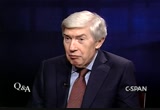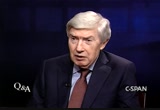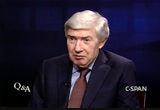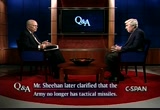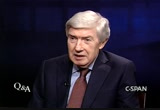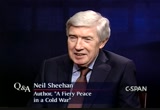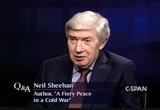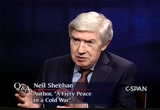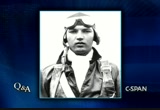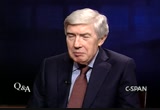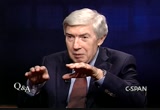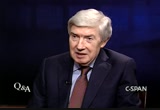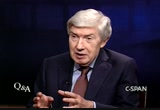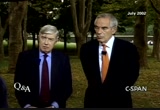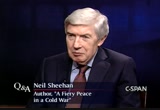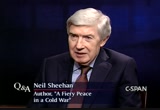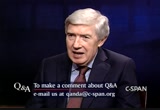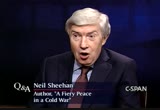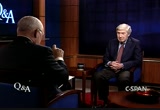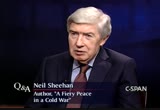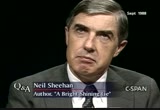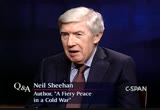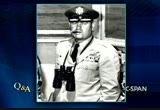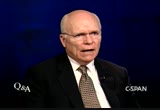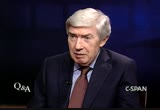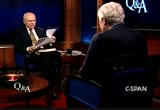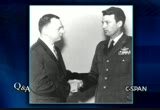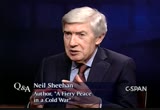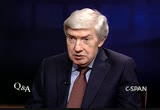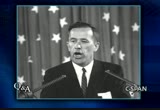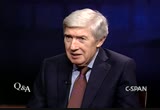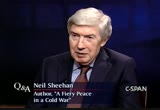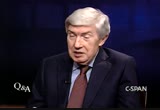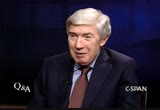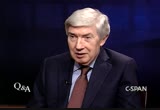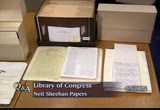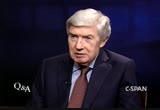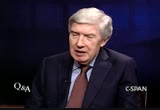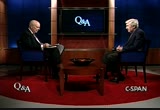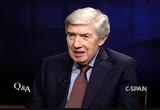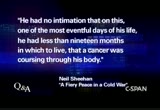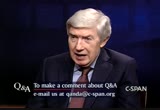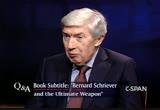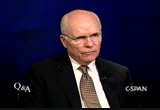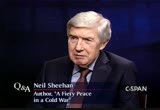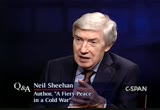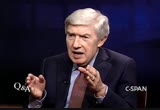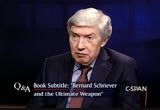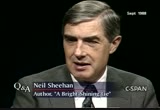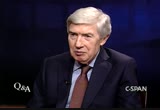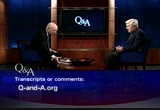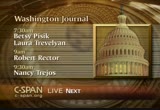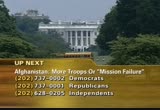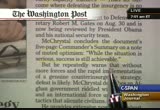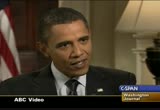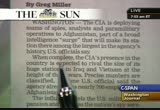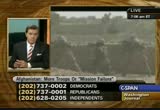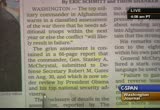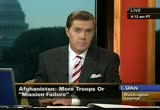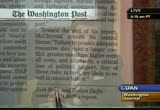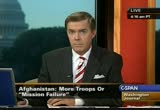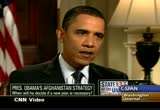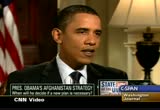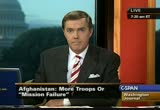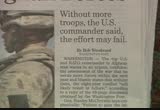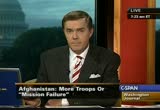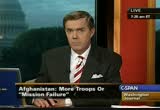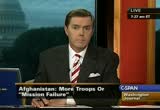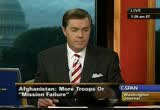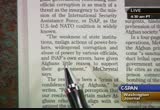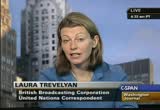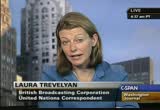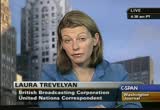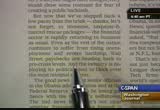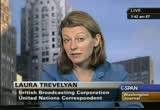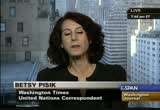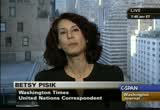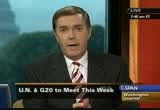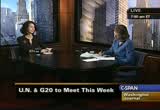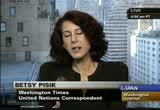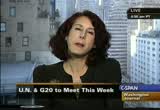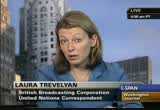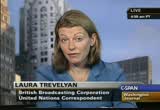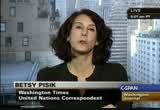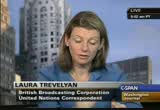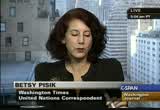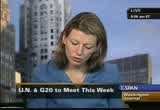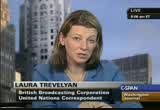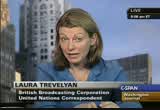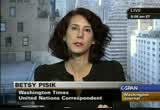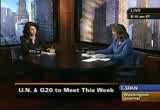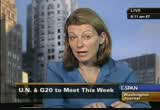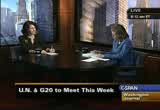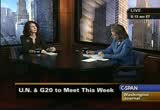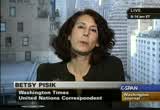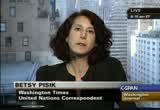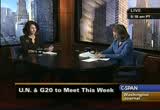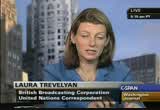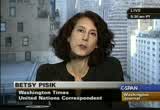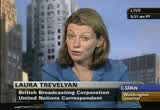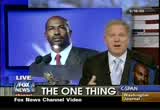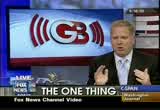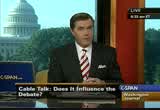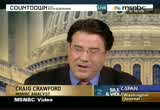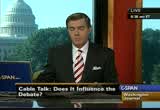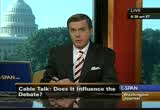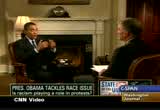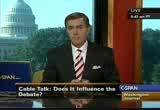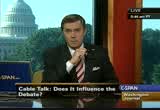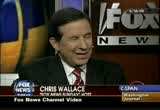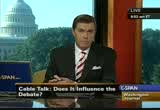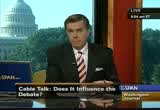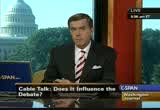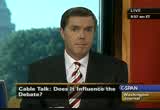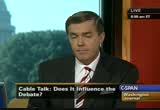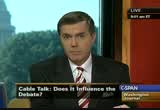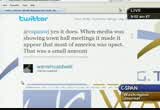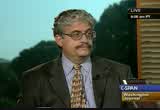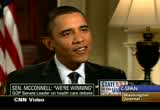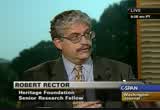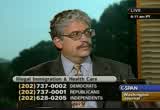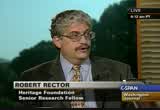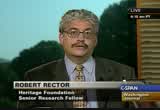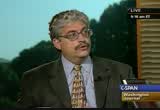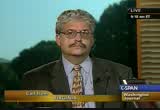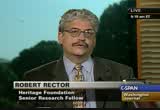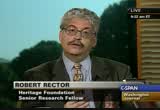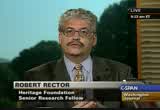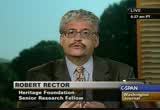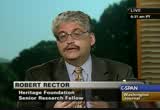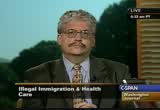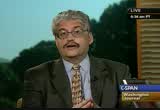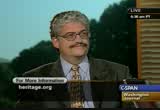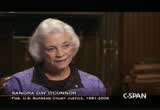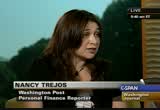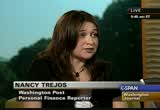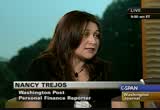tv Morning Express With Robin Meade HLN September 21, 2009 6:00am-10:00am EDT
6:00 am
>> this week on "q & a" our guest is neil sheehan. his new book is on the nuclear arms race told through the life of general bernard sleefer dshriever who led the research. we also look back at "a bright shining lie," america in vietnam. it won the pullitiesier prize in 1989. >> you started the trek to look at books and this interview show every sunday night at 8:00 and 11:00. i want to show you a little moment from 21 years ago. >> what do you want to do next? >> i don't really know. i want to help promote the book because that's a necessity.
6:01 am
and then the only specific thing i have in mind that i would like to do is to go back to vietnam, see what's happened to the country and write about it. then what i will do, i don't know. i'm not worried about it. i might go back to daily journalism. don't know. i've stayed busy all my life. and the one thing that i've been taught is that if you want to work, you'll find plenty to do. so i'm sure i'll find something. you learn as a newspaperman that you go from story to story. in this case i went to the book. it's moved on. -- it's done. i'll move on and do something else >> that was 21 years ago. the book i have in my hand is called "a fiery piece in a cold war." 21 years later, why did you decide to spend your time on this subject? >> i decided i wanted to write another book rather than go back to newspapering. first i went back to vietnam, as i mentioned. i did a short retrospective
6:02 am
book called "after the war was over." then it was -- i had to find another topic. it was time to move on. someone said to me, why don't you write a book on the arms race in the cold war? i said, my god, that's pretty diffuse subject. i want to do something with a narrative. and so i started researching. it's about 1994 now. i was over at the air force association in arlington here. right near washington. and i was in their library. and they keep files on prominent air force figures. someone said to me, you ought to look up bernard, or bennie, as he was called, shriever. so i asked for the file. she hand it to me. and i opened it up. and right there, the first -- the beginning of the file, was a photograph of this general leaning up against a table with
6:03 am
all of these missiles around him. it's in the book. that photograph. and i said, this guy looks interesting. so when i got hoax -- home, i asked some questions about him. he was well known within -- famous within the air force but not outside. and so i got home, i looked him up in the phone book. he turned out -- to be living in retirement eight blocks from my house. so i called him. arranged to come over and talk to him. and if t began the first of 52 interviews with him. and then i realized that this man had stood at a pivotal point in the cold war. we look at the cold war as one long, glacial period. but it wasn't. it was a period -- there were changes. particularly at the beginning. it was a very unstable business. in which we could have gone into nuclear war with the soviets. i realized after talking to
6:04 am
this man that he had stood at the center of that pivotal period. and when he and a group of others with vision had really saved us from what could will have with -- well have been a nuclear war. but for him and those who work with him, you and i might not be sitting here. we might well are eradiated dust. >> i have in my hand "a bright shining lie." it's the newer version just out this year. this book's about 800 and some pages long. do you remember how many of these, the original copies, sold in both paper back and hard back? >> hard cover sold in the -- the original hard cover sold about 165,000 copies. paperback, i don't know. a lot mover. >> in our interview, and for those who weren't with us 21 years ago when all of this started, we sat down in a studio across the hallway here for two and a half hours and ran five 30-minute programs
6:05 am
over five nights. and then you sat with us for a call-in show at the end of that fifth night that actually started "booknotes." we didn't start it until the beginning of 1989. but in that particular interview -- i'm going to show a clip from there. you talk about a man named john paul vann. this is bernie shriever then it was john paul vann. >> i realized that if i wrote a book about this extraordinary man, i could tell the story of the war through him. because he was such a compelling figure. and he summed up in the 10 years he had been in vietnam the american venture there. and he summed up the way we like to think of ourselves, the qualities that we admired in ourselves in that period. the drive, this brilliant, analytical mind, these incredible energy, sleeping four hours. only need four hours of sleep a night, the fearlessness, etc. he had an extraordinary
6:06 am
metabolism of all of these things that we really admired in our sexes as people. -- ourselves as people. he had devoted himself to vietnam. he had died there. i felt that if i wrote a biography of him, i could also write a history of the war. that's why i started out. then, of course, i was trapped in the enterprise. it was too late to go back. >> 15 years you spent on that book. how many years in total on this book? >> probably about 14 years. >> did bennie shriever turn out to be what john paul vann was for you? >> yes, he did. >> why? >> because there was a period, as a said in the cold war, when -- first we got the bomb. then we fell into this period of hostilities with the soviet union. and then they acquired their bomb. and it was a very unstable period of time. we were dependent because you had to bring this nuclear
6:07 am
possession of the bomb by both sides to some sort of stability. and there was no stability. we were depending on the aircraft, the bomber, the strategic air command under curtis lemay, the figure for the general in stanley kubrick's "dr. strangelove." we were depending on the s.a.c., the strategic air command. the soviets decided not go down that road. they were going down the road of intercontinental ballistic missiles. they were working their way toward building one. now, you only got 15 minutes' warning of an incoming missile this those years because of the limitation of the radars. and if they had acquired a fleet of icbm's, intercontinental ballistic missiles, they would have destroyed the credibility of the airplane as a deterrent, and you'd have gotten a pert of
6:08 am
real instability which you might have well have gotten some adventurism by soviet leaders which would have led to a nuclear war which would have destroyed the whole northern hemisphere because of the side effects of nuclear weapons. nuclear winter. the radio active dust coming down every time it rained and making -- killing everyone. and so you had to bring stability to this period. what -- shriever saw this. we had to build our own missiles to create a nuclear stalemate which is what he did, he and those who worked with him did. they created a situation where neither country could pull off what was called a first strike against the other and escape destruction itself.
6:09 am
lived in fear of what was called a nuclear pearl harbor, which was a surprise attack by the soviets. it's called a first strike in nuclear ease, nuclear strategy. by building our own set of nuclear weapons, we created the nuclear -- which neither could pull off the first strike and you got stability. which lasted. except for crecheoff -- who was the exemplar of that who almost triggered nuclear war. once this sunk in to the soviet leaders, you got people who did not want a nuclear war. he was a status quo type. he wanted to enjoy the perks of power, the mitts tresses -- mistresses, the hunting, the collection of foreign cars including a lincoln nixon gave him. these were men -- they were opponents but they were not interested in destroying their own country by attempting to
6:10 am
destroy ours. so these men really saved us from the possibility -- probability of a nuclear war. and they're genuine american heroes. he personified it. >> go back. this is in 1955 when all the discussions became very active up till this day. i got on the internet today. and you can correct me if my figures are wrong. but there is at least 5,, 500 intercontinental ballistic missiles active today. am i right about that? >> that's probably too large a number for icbm's but in terms of missiles, yes. you've got the navy which are icbm's, out of the nuclear submarines. and you've got 450 minuteman missiles, intercontinental missiles, on alert. and the army has tactical missiles. and all of that happens starting back when you started basically this book. >> that's right.
6:11 am
general lemay, in command of strategic air command, believed in the bomber. he had been the great bomber leader in world war ii. i don't know if you've ever seen "12:00 high" on late night television. it's about the bombing of germany in 1942, 1943. these men were going through without fighter escort, taking on german fighters forp an hour and a half, fighting their way deep into germany to bomb the industries. le may lost 40 bombers on the first raid deep into germany. but the bombers got through. he believed in the bombers. he wasn't interested in missiles. they were "fing firecrackers" as he called them. he was opposed to the program. shriever saw the missile would detroit probability of aircraft. he was a visionary.
6:12 am
and pressed ahead against major opposition from le may and the other bomber generals. >> how much fire power is there on the tip of one of those icbm's today? >> right now the minuteman has enough to destroy several cities. >> compared to, say, hiroshima or nagasaki? >> vastly more. two or three megatons. and one combleagton equals 80 hiroshimas. >> let me go back to bennie shriever, four-star general in the united states air force before it was over. died, as you say in your book, june 20, 2005, at 94 years old. you did 52 interviews with this man. set up that. what was the environment? and how long did you talk to him? >> we would meet on saturday. he was in between marriages when i first met him. we would meet on saturday mornings at his house, which is about eight blocks from where i live in northwest washington, by american university.
6:13 am
before he went to lunch at burning tree, his golf club. i'd pick wrup i left off the last time. i'd take thim through the story. he was a very -- bernie -- bennie was a very thoughtful man. he wanted to make sure that you were the person to tell his story. at first he was standoffish with me. then he decided i was the person to tell the story and became very cooperative. >> how old when you first met him? >> he was in his 80's. but had been in excellent health. excellent health with all of his mental faculties, fully intact. i asked him -- i told him, general, i've got have your entire military record, the whole thing from the very beginning from 1932 when he
6:14 am
joined the army air corps, including all your efficiency reports good or bad. he didn't have that. i said, you've got to submit it, ask for it, i need it. fine, he said, i'll get it for you. and he did. he withheld nothing. he told all the people who had worked for him, who were still with us, to talk to me to tell me the truth. and they, of course, led to others. and i was racing the grim reaper because these were older men. and their lives were in the twilight years so i had to really work fast and hard. i did 120 interviews. to get the interviews i needed, to tell the story, to get -- to tell the story. i believe, as you know in writing history in narrative form. i believe in catching that segment of history which is in
6:15 am
men's minds, the memory. it's an important segment of history. if you don't catch it while they're still alive, it's gone forever. >> the sidebar is the woman he married who people our age can remember her from entertainment years, joanie james. >> that's right. >> is she still alive? >> she is still alive. she's still living in the home they shared together where i first met him, before he married her. >> she was 20 years younger than he was. >> yes. they met down in palm beach and fell in love. and got married in his later years. he was 87 when they married. but a happy 87 to have married her. he was a lucky guy. i called shriever lucky. he never had -- he joined the air corps in 1932 when planes were quite unsafe. and flew through the air mill crisis when 12 pilots were killed flying these uninstrumented planes through snowstorms, hail storms, and whatever in the midwest trying to deliver the mail.
6:16 am
bennie -- and he flew constantly in world war ii. never crashed. >> you were at the funeral. >> yes. >> i'm just going to dip in to a little bit of the narrative here and ask you to explain a couple of things. you wrote, "he bent over joanie for a few minutes with words of condolence while everyone watched in curiosity." both of those, the last statement from you about the catastrophic war in iraq, i want you to talk about. but also before that, explain that funeral and why was don rumsfeld there and all the other, as you say, 44 stars there at that funeral. >> the chief of staff of the air force time -- first of all, i should back off. general shriever came to be
6:17 am
known as the father of the modern high-tech logical air force. as a result of building the icbm. and advocating other technological advances. he was, as i say, a technological visionary, like the founder of the modern air force, happ arnold. he was shriever's first commanding officer in 1932. and he was a technological visionary. and shriever was, in effect, his disciple and his descendant. the air force was deeply grateful to this man for what he had accomplished. and for the air force, he really created. so general jumper, chief of staff, decided he was not going to be buried as just a four-star general. he was going to be buried as a chief of staff so they gave him all the honors they would have normally given the chief of staff, the flyover of the planes, which is very dramatic, three aircraft, with a space for the missing co-pilot,
6:18 am
missing wing man. then rumsfeld, i gather, felt that he had to come and pay tribute, too. and so in the midst -- at the last minute, just before the last few minutes, just before the ceremony ended, rumsfeld suddenly showed up from the wings. joanie, who was a stage star, said he looked like an actor coming in from the wings. he came in. he said some words of condolence to her, and then he disappeared. >> how well did you get to know him from a personal standpoint? and 'twas tough on you when he died? >> it was in the sense -- well, he was 94 years old. he was declining and had been declining for several years. but it was tough in the sense that i hated to see -- i had gotten to respect this man and we had become very good friends.
6:19 am
and i had really come to respect and understand what he had accomplished. he said to me after we got to know each other well, during one of their reunions, these men had a reunion every year. they call at the time old-timers reunion. i went to every one of them. he said to me at one of them, look, i want you to do this right. i won't be here when it's finished. i know that. but i want you to do this right. i want you to tell the story right so i had enormous respect for him. but he died in the fullness of life. and so in that sense one couldn't regret it. because he had had a really full life and a good life. he had accomplished what he had set out to accomplish. he had helped me to tell the story through people. i believe in writing history well in a narrative form, a novelistic form.
6:20 am
but you have to be careful. it's tough to do it that way because you have to make sure you don't distort the truth. by using him, he was my lens on this story as vann was my lens on vietnam. >> i want to talk about the vietnam thing and to connect it again, and ask you after we show this clip about your statement about the iraq war. the last time i saw you was about 10 years ago. we did a series on writers. we were down on the mall near the vietnam me northerly. -- memorial. we talked for three hours about your book and his book. but let's watch this. >> will there ever be coverage of any future endeavor in this country like there was in vietnam? >> it's america's involvement. i would not think so because i don't think we're going to get into a long, grinding war like
6:21 am
that again. in the gulf war it was all high technology. then you had about four days of armored combat. and then, of course, in afghanistan it's very elite units that go in where you really can't have reporters, i don't think, camping out with them. but part of it is the new nature of the technology and the elite units, laser-guided missiles and stuff like that. part of it is a desire to control the reporting. but you really can't control the reporting if things don't work. it will out. if it doesn't work, people will know. >> david halberstam, killed in an -- a strange automobile accident in california. start with that. what was your reaction when you heard that? >> oh, it was devastating. david was a very close friend. he and i were partners in vietnam. we had worked together there he worked for "the new york times." i was with the u.p.i. we partered up. we would each -- we shared an
6:22 am
office, which was the front room of my apartment there. it was the dining room table. he typed on one side. i typed on the other. we kept the friendship all of those greers 1963 on. we didn't see each other as often as i would have liked because he lived in new york and i lived down here. but we'd talk on the phone frequently. i hear his voice all the time. the phone rings and i hear david say, "how are you doing, old buddy?" it was a very close, wonderful friendship. it was so sudden. his death. in that auto accident. susan, my wife, who is also a writer, she came up the stairs and said "david's gone" and she was heart broken over it. and i was just -- i broke down. i couldn't help it. he made -- he meant so much.
6:23 am
he was a wonderful journalist and a great guy and a real loyal friend. >> we have some video of this meeting. >> we met 40 years ago and we've been pals ever since. the goddaughter -- we worked together. i felt i was so lucky to have a younger brother that i had never had out there. i mean, to work with someone so fearless and so optimistic and so talented a reporter. it was one of the gifts of my life. >> had you seen him much over the 10 years? >> yes. as i said, we'd talk on the phone. he came down for my daughter's wedding. he was the godfather of our older daughter. we kept up the relationship. >> as you know, you were responsible for the pentagon papers being published in the "new york times." but prior to that you and david halberstam and malcolm brown and that still had this profile, and people still can get upset to this day what b what they think did you to the
6:24 am
whole vietnam war. what's your take ton all of these years later? were you right? >> i think we were right. >> what does that mean, being right? >> we told -- we reported what was really happening in vietnam. the command in those early years, general harkins and the ambassador general -- about a ambassador million to tee, were convinced they were winning the war. and the regime was respecteded by the population. it was a myth. it was a total myth. they were losing the war. there wasn't respect even by his own people. he'd come down for a speech at the national assembly, which was a phony body he selected, you'd see the civil servants assembled. they'd lie down and go to sleep in the street. it was incredible. and we would go out to the countryside.
6:25 am
and the military advisors like john vann, would tell us that the war was being lost. and then we would go out on military operations and see it ourselves. we'd go back to saigon and write the story. and all hell would break loose from the military headquarters. we'd be told how displeased general parkins was by our reporting. well, i later on discovered that these advisors in the field who were telling us the truth were also telling the truth to general harkins. when i wrote my book, i saw their reports. he just ignored them. ignored the reports of his own people who said, general, we've got terrible problems here, we're losing the war. shriever didn't do that sort of thing. one of the reasons shriever succeeded at a very difficult task, to overcome the technological problems inherent in building these missiles, was because he was willing to listen. he would always listen.
6:26 am
he did not hold progress briefings like harkins did. there was no retro briefing of most army generals. parkins was the perfect example. it was always progress. shriever held -- was within the opposite. he told his people, look, i can -- give met bad news. i can stand the bad news, i will not fire you for giving me the bad news. i will fire you if you don't give me the bad news. they'd have a monthly briefing they'd call black saturday which was -- in which you talked about your problems. his attitude was if we solve the problems, success will take care of itself. >> come to this statement you make in this book, i'll ask you. why did you say that the george bush iraq war doomed to -- and don rumsfeld, doomed to a resignation of disgrace because of his promotion of the
6:27 am
catastrophic war in iraq why do you say that? >> because it's gone on for all of these years. without any resolution whatsoever. we've spent god knows how much money involved in the process. we've lost a hell of a lot of lives. we've inflicted terrible pain on the populations of iraq and killed a hell of a lot of iraqi people for no good end. there still is no resolution to it. and no one has any idea of what's going to happen in the future except that there might well be more okious. -- chaos. if george bush had really been involved in the war of vietnam, which he wasn't, he escaped it by joining the texas national guard which his father got him into, and cheney got five draft deferments, rumsfeld was not involved in the war, wolfowitz got several draft deferments. these men were not involved in vietnam. if they had been, they might have known that you don't fight
6:28 am
unnecessary wars! you don't go off and fight a war of choice. which is what it was. because once you fire the first shot, you don't know what's going to happen after that. their misjudgments in iraq were colossal. from the very beginning when the looting started in that museum in beagged, you were like, this thing is out of control. these people have no idea what the hell they're doing. >> back to the two books. the one on vietnam, the current one on bernard shriever. one or the other more easier or more difficult to write? >> they were both very difficult for me. >> let me show what you you said. i asked about something called writers block back in our first interview 21 years ago. >> you ever find yourself blocked when you were writing? >> not blocked. but i found i would spend days
6:29 am
bat earg with a at the problem. -- battering away at the problem. you're look at a book that is long, 60,000 words, and covers a long expanse . would i spend a day -- i would spend a day and not finish what i started out to do that day. i would not write those pages i had wanted to write that day because i hadn't solved the problem, let's say, of telescoping historical things. telescoping a section on vann's life. i wouldn't be able to sleep that night. i might not solve the organizational problem of putting those pages together until the end of the day, let's say. and then would i go out and take a walk, come back, write down an outline and then i'd be able to sleep. but some nights i couldn't sleep. >> can you apply any of that feeling you had back then to this book? >> i was able to sleep this time. but i got thoroughly exhausted through the process.
6:30 am
it was the same problem. taking a vast amount of material and telescoping it into a narrative which told the truth but which was moved fast, which an extraordinary reader -- not a specialist. this book is not a hardware book. it's not written for the specialist. it's written for the general public. which the ordinary reader would want to read. i found that -- for instance, the amount of reading i had to do was enormous. on the cold war. on figures like stalin who was -- and then you pick out the nuggets. it's like panning for gold. you pan an awful lot of gravel just to get a fleck of gold. and the same thing was true -- i wrote, for instance a parole file -- profile of general le may who was a great opponent of this program. and the profile was much too long. i spent a long time researching
6:31 am
it, a long time writing it. then my editor and i agreed it was far too long. i had to tell -- it was about 35 or 40 pages. well, i had to tell the same thing in nine pages. but you don't just cut. telescoping isn't cutting. you've got to say the same thing in nine pages that you said before in 36 pages. and all of this took enormous amounts of time. >> your editor for both. >> i've been very lucky. he's a wonderful editor. he has a great -- he helps you to shape a book. he has a great sense of pace, a narrative. when you've gone off the track, had a wonderful way of putting you back on. he's not a line editor. he'll suggest a word here or a word thrmple and he'll suggest changes in tone. but he makes do you it yourself. >> i'm going to page 287. i don't know how much of this we can do. but i'm going to read back to
6:32 am
you and stop periodically to ask you questions about what i'm reading so people can get a sense of your narrative. this is chapter 46, "dazzling the monarch". let me just briefly tell us why did you call this "dazzling of the monarch?" >> because eisenhower -- they had to go to the president to get this program going. they started it in 1954. but the beaurocracy had built up so great in the postwar period that it was impossible to get the thing moving. shriever had to go to 42 different people, 42 different offices to get clearances for what he wanted. it was a hassle just to buy an air-conditioning unit to protect the computers for this company they hired for scientific expertise.
6:33 am
t.r.w. thompson, they hired as their scientific expert so they had to get clearance of the type of manhattan project they had. clearance from bureaucratic interference, streamlining the decision making. plus funding which was their own which no one else could interfere with. evenly the president could give you that. only the monarch could give you that. >> let me read this back to you. of "bennie shriever arrived --
6:34 am
"it been decided that shriever would anchor the briefing by wrapping up at the end." trevor gardner, who was he? >> he was the assistant secretary of the air force for science and technology and was in his own way a visionary. and shriever had recruited him. shriever, when he first caught on to the idea, was just a colonel. on the list for brigadier. that's pretty low on the pecking order at the entergone. he needed somebody higher to get the thing going. and trevor gardner had come on. he was another immigrant like shriever. he had gone to cal tech. he was an electrical engineer by training. really a technological visionary in his own right. could see the problem -- he could see the possibility of technology. shriever recruited him.
6:35 am
>> bernie shriever, you say in your book, until 6 was a german citizen? >> yes. all three of those men you mentioned were all immigrants. shriever came here when he was 6 years old from germany. his mother brought her two sons here. two months before we declared war in germany in world war i. they went to texas where he grew up. trevor gardner was a welshman. his father was a boilermaker in south america, boiler engineer. he came here when he was a young man, went through cal tech, got educated here. john was a mathematician with a mind second throin einstein's who developed the first electronic computer and developed storied programming for the computer, among other things. he came here as a refugee from nazism. he was hung yarian bore born. -- hungarian born. he was terribly important to
6:36 am
the project because he had eenormous prestige from world war ii. he had developed the plutonium -- the explosive wrapper around the plutonium bomb, the nagasaki bomb. he played a critical part in building the bomb in the manhattan project and had great prestige. shriever recruited him for the program. >> von noyman? >> yeah. >> they had been told by the national security staff that they were restricted to a half an hour in all for the three presentations. power -- who was he? >> he was the head of the air force research and development command. he had been le may's deputy at strategic air command. he had been le may's deputy since world war ii. he was the guy who flew over tokyo during the famous firebombing and had been the deputy commander at s.a.c. and made head of the air force technical command, air force research and development
6:37 am
command. of -- although he was le may's disciple, rather, le may's protege, he was not locked in. and shriever had converted him to the idea of building these -- >> we also mention in here charlie wilson. >> yes, engine charlie wilson. he was the secretary of defense who was opposed to the program. but they overcame him, too. they had enormous obstacles to overcome. they had to intrigue their way into this briefing. they knew they had to see the president. and get the president to clear the brush out of the way if they were going to get the job done. but you just don't ring up the president. so they went about an elaborate process of intrigue. they started -- they leafed class -- leaked classified reports to senator henry
6:38 am
"scoop" jackson a big hawk from washington. and he held hearings in the joint atomic energy committee. they fed him information through these hearings. and they were closed hearings. secret hearings. then jackson and another prominent senator wrote president eisenhower and said you've got to look into this thing, this is terribly important and you're not looking at it and you've got to do something about it. you've got to be briefed on it. eisenhower told the head of the n.f.c. to schedule a briefing. not knowing that the men who were going to brief him were the men who drafted the letter that jackson had signed. and who had incity gate the whole thing. and the head of the national security council before the briefing whezz giving the instruction of how they've got to keep this thing to half an hour, etc., told them they were not under any circumstances to refer to this letter which had been sent to the president.
6:39 am
by scoop jackson. not knowing that they were the guys who drafted the letter. >> this kind of thing still goes on today. >> it still does. it was very -- i must say, very shrewdly done by them. it was absolutely necessary. the briefing was on july 28. eisenhower, you had some bureaucratic balderol to go through. eisenhower signed off on this thing and then had a heart attack 10 days later and wasn't able to hold a cabinet meeting for two months. >> you got one of the biggest leaks of all time. >> that's true. >> pentagon papers. >> that's true. >> i remember when robert mcnamara was here. i asked him whether or not he had ever read the pentagon papers. he told me they were in his garage. he said he never read the papers. >> that may be true. i'm not sure that's true. >> because? >> because i think his conscious may have drawn him to reading parts of in the case.
6:40 am
he knew we were going to publish it. >> you've admit who had leaked the papers? >> [inaudible] >> let me go back to this narrative for this book. >> a long, complicated story. >> you write -- page 289. vince ford and berl proceeded him to the white house. as i'm reading this, i'm saying to myself, how did he get this stuff. who told you this stuff? >> this is another important thing. vince ford had put together a memoir. vince fords with a colonel who worked first for shriever and then for gardner. ford had written using schreiver's papers, a memoir which he let me have. a copy.
6:41 am
of it is a huge man script. >> never published? >> never published. it never will be published. it's well over 1,000 pages. >> and let you have it? >> will he -- he let me have it. did you read the whole thing? >> i read the whole thing. also i read all of schreiver's papers. >> there's a quote -- no. it's on the same page. i wanted to ask you about this. you say he wrote this in his diary that night, the night i guess before. "termites in the woodwork." >> yes. that was schreiver's term because he sensed the hostile. when he got this briefing from the head of the n.f.c. who told them, now, gentlemen, you're restricted to half an hour, you're not to refer to this letter from senator jackson to the president, in order to pressure him into doing anything that you want him to do. schreiver realized this man was not in favor of the program. and his term for that was
6:42 am
termites in the woodwork. he had such wonderful phrases. >> how much of a diary did he keep? >> he kept -- his diary was speak sporadic. it was a daily diary but it was a working diary. he would write down appointments. and remarks. they tended to be terse except when something big occurred, and then he would write a memorandum as did he for this briefing which he gave me. >> is vince ford alive? >> knox he precede schreiver. and his job was? >> he was assistant to gardner. but his job was really intriguing. his job was behind the scenes man for schreiver and gardner. >> how much were you able to talk to him? >> i interviewed him at great length as well. >> all of this on tape?
6:43 am
>> yes. it's all on tape. it's sitting at home, on my computer, the transcripts of the interviews. i'm not online. i don't have email because i had been warned by the computer gurus that if did i get it, sooner or later somebody -- i'd get a bug in that computer and lose the book. >> as long as we're talking about this because i assume you'll have the similar reaction. i got my hands on the papers of finding aid to the collection of the library of congress. we had some video of your collection there. you can see it on the screen. where is this? over in from the john paul vann story? >> i will eventually give these paperers to the library as well. these are the papers i gathered in the course of writing this book. my personal papers went over to the library to be put with the vann papers. when i wrote the vietnam book, i had all of john vann's
6:44 am
papers. his family gave them to me. in exchange -- >> can the public see this? >> oh, yes. all you have to do is go to the library of congress go in the man script division reading room. it's fully available. >> are there audiotapes? >> yes. 185 of them -- 285 of them from the vietnam book. >> and how many from this book? >> well, i did 120 interviews. i'd say about maybe 150. >> can people record them? >> well, i don't know if they can record them. they'd have to ask the library there that. but they will be available to listen to just as my vietnam tapes were available to listen to. i believe in preserving these things. and the library of congress does a wonderful job of preserving under jim billington. set up a system where this wonderful security of the manuscript reading room. you have to agree to be searched. you lock up everything, including your pens. they issue you a pencil and
6:45 am
bring you out the papers to look at. >> back to this narrative in 1955. you say here that it was often -- the room is a broadcast room. is that still there? >> i don't know. it's been very hard. i don't think it is. >> in the west wing of the white house? >> yeah. the white house keeps changing constantly. as far as i can figure out that room is gone. >> did you try to see it? >> i did. i was told, well, nobody really understood -- knew whether it still existed or not. it's another -- if it's still there, it's another room. >> you say it was often used for briefings. and on this humid washington morning in july it was filled with rows of straight-back wooden chairs. " why did you put that? >> it's a nice detail. and because offense the monarch. you have to remember that after
6:46 am
world war ii, when we had president roosevelt who was such a great and towering figure, the president -- the american presidency acquired enormous prestige. until the war in vietnam changed matters and tipped things the other way. the president -- the presidency was far outweighed in influence. the legislative or the judicial branches of the government. and the president was treated as a monarch. to the point of john kennedy adding six or eight trumpets to the three or four they had already. they had a regal atmosphere to it. and eisenhower, of course had also the reputation of every commander and chief during world war ii. so he really was the monarch. >> you point out that the meeting got started a little late. normally presidents arrive -- some president as rive on time. -- presidents arrive on time,
6:47 am
at 10:00. they had not waited long when suddenly the door swung open and eisenhower appeared striding at a fast pace down the corridor. . he seemed angry about something. his face flushed. whatever it was concerned defense secretary wilson who was walking beside him. secretary wilson used to run general motors? >> yes, he's called "engine" charlie wilson for that region. >> both men entered the briefing room. the briefing then. what happened? >> well, the president said -- sat down, nodded to the head of the n.f.c. who was up at the podium. and he gave a very brief introduction. and the first guy to get up was gardner. and the tactic was very clever. gardner scompare scared the bejesus out of everybody in the room. you're talking about the whole of the american establishment. the governmental establishment. the chairman of the joint chiefs of staff, other members of the joint chiefs, the cabinet secretaries.
6:48 am
he proceeded to tell them just how dangerous the situation was. the soviets were in the process of building these things. we were not doing it seriously because of the impediments to it and it was 15 minutes. to doomsday. because that's the only warning you got. and then he passed it who again scared the living bejesus out of these people. gave thement analysis of the size of the warhead, the explosive force, etc. and then they set it up so schreiver could wrap it up and tell what was needed to get this thing done. to correct this very dangerous situation. >> one line i want to read. he had no intimation that on this -- talking about von noyman" one of the most
6:49 am
eventful days of his life he had less than 19 months to live to which the cancer was coursing through his body. >> it was a tragic thing. he's not remembered now. it's very sad. he died at the age of 53. he had testicular cancer. they had just discovered -- they hadn't yet discovered it just before the briefing. they discovered it a month later. of -- in august. he died then 19 months later in walter reed. >> there's a lot more that we're not going to be getting to because it's a long narrative. but what did the president say after this briefing? and how long did the briefing go? >> the briefing lasted -- ran an hour and a half. von noyman in particular ran way over his anytime but never lost a bit of the attention. they could see from the beginning they had the attention of the president and of the audience. then schreiver got up to give the final briefing.
6:50 am
they had an eight-minute film of rocket engine testing in california. they were testing the first engines. these fiery things. they'd lash them down on concrete stands and test them, fire them. they had an eight-minute film of this to show the president at the end of the briefing if he wanted to see it. so schreiver knew how much they were running over their time. so he started his briefing. he was a very impressive figure, handsome. bennie schreiver was one of the most handsome men i ever met. in those days with the uniform, those strike going looks, this tall man, 6'3", slim. he started his briefing. then he stopped. and he said, "mr. president, we also have an eight-minute film we'd like to show at the end of this if you wish to see it."
6:51 am
and eisenhower nodded to him. in other words, you've got all the time you want, general. just go right ahead and brief america, tell me what's going on here. and ford noticed that eisenhower had moved forward. and he was sitting on the edge of his chair. he was no longer sitting back in the easy chair. he was on the edge of it. sitting like this. as schreiver was briefing him on what they needed to do to get this thing working. >> and you say that general eisenhower got up to the podium after that and said, "this has been most impressive, most impressive. there is no question this weapon will have a pro found impact on all aspects of human life, not only in the united states but in every corner of the globe -- military, associate logical, political." did that pan out to be an accurate statement? >> it's a bit brewed r broad but it's true in the sense that what it did was keep the peace. >> on the next page you bring in the vice president of the
6:52 am
united states then, richard nixon. what you quote here is him saying "why haven't we started this sooner" after general eisenhower left the room. "what's been the holdup," the vice president said, tapping the palm of his left hand in a gesture of emphasis that was peculiar to nixon. >> nixon would at a do that. >> five years later in 1960 missile gap was a charge from the kennedy administration -- or the kennedy candidate to the eisenhower administration. it turned out after it was over supposedly there was no missile gap. fill us in on that one. >> there was a missile gap. the gap was on the soviet side. by that time schreiver and his guys had surpassed the soviets in the race to build an icbm and to create a nuclear stalemate.
6:53 am
but politics being what it was -- remember, we still had just the u-2 then. we didn't have the spy satellites. the u-2 showed the soviets did not have -- there was no missile gap. they did not have a useable force of icbm's. and eisenhower -- but eisenhower didn't want to admit what he was getting from the u-2. he held things close to his chest. and nixon had been briefed on it. they briefed kennedy on it. and kennedy stopped talking, who was using this missile gap business. this country has been filled from the beginning of the cold war with fear mongers. beginning with that really erroneous long telegram. and then the hysterical national security memorandum,
6:54 am
you know, "the russians are coming." stalin has a plan for world conquest. they're stronger than we are. they'll be in paris in the morning kind of business. so kennedy was taking advantage of this, the charge that there was a missile gap. and he was briefed on it given the secret briefing as presidential candidates did. and he stopped talking about it himself but didn't tell his other campaign supporters to stop talking about testimony >> let me ask you again. back then and in your book you talk about thompson, ram oo and woolridge who people would know as the t.r.w. corporation. they were involved in all of this talk. did they end up benefiting from building of the missile? >> oh, yes. simon ramo, the scientistic -- schreiver realized, and so did gardner that we did not have an
6:55 am
aerospace industry in this country. we had an aircraft industry in 1953, 1954, but not an aerospace industry. the aircraft companies were not capable of providing the expertise needed to overcome the technological problems involved in building this missile. so they had to create an aerospace industry. they had to get the scompeertose to do it. ramo, a product of cal tech and had been at general electric and then started his own company with dean woolridge after turning -- after building the first air-to-air my yill for the air force -- missile for the air force at hughes aircraft, they spotted him. they realized that he not only had the sense, the expertise to overcome these technological obstacles himself but would gather the talent necessary to do it. and he and woolridge break away from hughes, and formed a
6:56 am
company which was designed to get high-class talent recruited , high technology talent. and so schreiver and gardner recruited and put him to work, ramo, to work. both technically both ramo and his partner. but it turn you had out -- and the reputation they built was a basis for t.r.w. >> as a said 21 years ago, you sent ounce this mission of over 1,000 interviews in this time slot. but mostly about books. but i want to show the audience what you said 21 years ago about the impact of the book you wrote, "bright shining lie" on your family. give us an update. let's watch this. >> the book was a very difficult time for the family all of those years. although, actually, it made us closer as a family. i was around to help raise my children where as i might have been on the road.
6:57 am
>> two kids? >> two daughters. i think the girls are happy. daddy's book is finally done. >> how are they doing? >> our youngest is 19. throughout most of her life it was daddy's book. a family word was when daddy's book is done. daddy's book is finally done. think they're happy. >> those daughters are how old now? >> one is 42 and the other is 39. >> where are they? >> the younger one, the special asis tabt to the general counsel of the f.b.i. she's here in washington. she's married. she's given us one grandson. and she's pregtpwhant another boy. -- pregnant with another boy. the older daughter has been unfortunately disabled through failed surgical surgery. she's active in the sense that she's able to drive and move around, but she can't work anymore. but she still -- we have a very close relationship with both of them. >> and wife susan?
6:58 am
>> wife susan is still writing. she writes mainly for architecturally digest. because "the new yorker" has changed. they've all been very patient with the book. as they were with the first one. daddy's book is slow. >> we're out of time. this looks a lot like the last book that you wrote, the cover. neil sheehan, "a fiery peace and the cold war: bernard schreiver and the ultimate weapon." we thank you for joining us. [captioning performed by national captioning institute] [captions copyright national cable satellite corp 2009]
6:59 am
7:00 am
>> "washington journal" is next. host: good morning. without more troops, u.s. efforts in afghanistan will likely result in failure. that is the conclusion of general stanley mcchrystal, and reported this morning by bob woodward. from page of "the washington post," and our first question this morning. we will also hear more about health care and the economy as president obama travels to detroit, new york, this morning, and appears on the david letterman show tonight. in the week ahead, the federal
7:01 am
reserve board open market committee meets in washington. the u.n. general assembly convenes in new york, and the annual meeting of the g-20 gets underway and thursday -- gets under way on thursday in pittsburgh. 202-737-0002, it is our ally for democrats. 202-737-0001 for republicans. for independents, 202-628-0205. bob woodward, who has the story, the top commander in afghanistan, and general mcchrystal saying emphatically, "failure to gain the initiative and rivers in search momentum in the near term while afghan security capacity matures, risks and outcome where defeating the conservancy -- the insurgency is
7:02 am
no longer possible. while the situation is serious, success is still achievable." the president appearing on five sunday programs including abc's "this week, up in which george stephanopoulos asked about afghanistan. >> when we came in, basically there had been dressed in our afghan strategy. everybody and acknowledges that. i ordered a top to bottom report. the most important thing i wanted was us to refocus on why we are there. we are there because al qaeda killed 3000 americans, and we cannot allow extremists who want to do violence to the united states to be able to operate with impunity. now, i think we have lost that focus for a while and you started seeing a classic case of mission creep where we are
7:03 am
just there and we start taking on a whole bunch of different missions. i wanted to narrow it. i did order 21,000 additional troops there to make sure we could secure the election because i thought that was important. that was before the review was completed. i also said after the election i wanted to do another review. we had just gotten the 21,000 in. general mcchrystal, who has been there for three months and down his own assessment, i am now going to take that information and we are going to test whatever resources we have against our strategy. host: "washington journal" -- "the washington post" also reports, "more afghan forces." and from the baltimore sun, "cia's afghan imprint rosgrows." " part of a broad
7:04 am
intelligence surge that would compete or rival in size with iraq and vietnam at the height of those wars. precise numbers are classified, but one u.s. official said the agency already has nearly 700 employees in afghanistan." on to your phone calls. general mcchrystal saying more troops or mission failure. your reaction -- charles, joining us from telepath so. -- from el paso, texas. caller: based on general mcchrystal's request for more troops, what i think is that if you get more troops, that is fine if we need them, but exactly what is the mission objective? he says mission failure. what is the mission in the first place? host: what do you think the mission should be? caller: well, you are going to have to educate the youth of afghanistan if you want to stop them from joining these radical
7:05 am
groups like the taliban and supporting al qaeda. because we know that the taliban is a refuge for al qaeda, so you have to educate the youth, but, you know, we do things like build schools. we're trying to educate the kids, but then you also hear stories that we end up blowing up the schools because the taliban have been coming in and taking the school's overhead and are using them as refuge houses -- taking the schools over and are using them as refuge houses. there is no really defined mission on how to win in afghanistan. host: charles, did you serve in the military? caller: no, i did not. host: you sound like somebody who is familiar with that part of the world. caller: i have family members that work in the military and were working majorly in the
7:06 am
reconstruction in iraq and afghanistan, so i have talked to them a lot about it and i am well versed on the subject. host: that is some of the video from afghanistan. sue is joining us from illinois. caller: i would like to make a statement. i am a nurse with 38 years' experience, and i have a son who is in the u.s. marine corps and a veteran of the war in iraq. i think afghanistan and the economic issues of our military defense are linked with the whole health care debate right now. people differ on how they project our national budget and military defense, but, you know, korea, iran, afghanistan now, and we are still in iraq -- the issues of our national
7:07 am
city has changed so significantly that i am not sure the military -- of our national safety this change so significantly that i'm not sure that telerate is a debt -- that the military is adaptable to the current situation that we have. i respect the courage of the men and families that serve their, but the fact is now al qaeda and other terrorists have branched out to pakistan, ethiopia, other areas of africa. we have to change the fundamental way we are approaching our national defense. you know, it is more the drain on our national security and budget said that people cannot even support the basic fundamentals that everyone should have health care in this country and find a way to economically do that.
7:08 am
i think we need to really, really change the way we are training people who are military personnel. afghanistan has been a deep hole for so many countries for centuries, and i have great concern about nation-building. host: a look at the front page of "the new york times," a photograph. healthcare is the dominant topic in the conversation sunday morning, but also afghanistan. below the fold is the report about "obama told of afghan failure unless he sends more troops." "the top military commander in afghanistan warrants that there -- that he needs additional troops within the next year or else the conflict will likely result in failure. the grim assessment is contained
7:09 am
in a 66 page report and is now under review by president obama and his top national security team." one other report in the memo by general mcchrystal, "failure to the the initiative and reserves the insurgent momentum in the near term -- and reverse the answer to momentum in the near term while defeating the insurgency is no longer possible." 202-737-0001, for republicans. 202-737-0002 for democrats. you can also send us an e-mail, journal@c-span.org. bill from st. charles missouri, democrat slide. caller: it sounds like vietnam to make. i think we need to remove our troops. a years after 9/11, i think everybody but our news media and our politicians know everything about the fact that
7:10 am
everything in the iraq and afghanistan war was a lie. we are not going to win there. and just like vietnam, we will be run out. that is my take on it. how many trips have we sent in afghanistan, and we are still not going to win. host: frank, good morning. caller: i watch you every morning. my take on the war is that for centuries afghanistan has never been conquered. they have been occupied, but they have never been conquered. the english tried it, the russians tried it. all the great world leaders through history have tried to conquer this country, never succeeded. what gives us the right to think that we can succeed? every time we killed one of the afghans, we create more terrorism. the solution is education. we go in there, send advisers,
7:11 am
educate the people, and at that point what we do is try to educate them to a certain extent, educating rather than killing. thank you. host: a sidebar analysis, "changes have obama thinking more strategy." "although obama endorsed a strategy executing and resources and integrated civilian military counter insurgency strategy, there have been few significant changes in afghanistan in washington since then. the disputed presidential election, and erosion in support for the war effort among democratsd in congres, and top advisers in defeating the insurgency. wuxi the excerpt in a moment
7:12 am
from cnn, but first we'll hear from -- we will show the excerpt in a moment from cnn, but first we'll hear from sarah. caller: i do not think we are going to win this war in afghanistan. number 1, it is because the united states is too divided. al qaeda made a statement that they are laughing at us. they are saying that we're not going to win. the rest of the country, the united states is not behind the leadership, and the internet -- and the enemy is laughing because they know that when you are divided. -- because they know that when you are divided, you cannot win anything. i think we should get more behind the leadership because there is strength in numbers. when everybody is this divided,
7:13 am
with the united states making fun of the president and you have all this chaos, the whole world is watching this country. the enemy is really laughing at you. host: thanks, sarah. the president will be in new york for the meeting of the general assembly. bill is in texas. good morning. retired military? caller: 25 years retired. host: when did you leave the military? caller: 1995, which means i had a little bit of experience in the vietnam war and other conflicts. since the vietnam war and the last one, iraqi freedom, which i attended. i kind of know what is going on there. and listening to some of our callers this morning, none of them had any military experience. none of them had any idea other
7:14 am
than watching in is what they think is going on. the problem in afghanistan -- and you keep hearing talk of the war in afghanistan -- it was never a war against afghanistan. it has always been a war against the terrorists and the taliban. back in the 1980's when i was there, if you get over there and see exactly what is going on with the people, just about 80% of the population are heroin or opium addicts. they have no clue. that is the reason they are so easily led by these so-called radicals. host: let me go to the jump page of bob woodward's article in "the washington post." he writes that the command is not adequately executing the basics of counter insurgency by putting the afghan people first. when you hear that, what is your reaction? caller: it is the afghan people. like i said, i was there.
7:15 am
you hear one caller calling and saying we need to educate the children. it is not going to work, and it is not that we are not putting the people forward. the people reject even being put forward. when you have people that are 80% opium addicts, they are dumb ed down. that is the stone cold reality of it, but nobody wants to report that. they talk about let's build schools, let's go out here and gave a well. these folks do not care about that. you build a well, they will stand out there and look at it. host: let me read the conclusion of general mcchrystal's report. failure to provide adequate resources also risks a longer conflict, greater casualties, higher overall cost, and ultimately a critical loss of support. and of it -- any of this will
7:16 am
likely result in mission failure." caller: it goes right back to vietnam because he is being used just like westmoreland is being used, as a political pawn. president obama needs to get serious about winning a war, not going in and rebuilding schools or digging wells. he needs to get serious about going in and defeat the enemy, al qaeda prin. host: can you a envision a scenario where the president will say no, we cannot send in more troops? caller: yes, because other issues, his health-care plan and economic stimulus plan -- mark my words, you watch what president obama does. mark my words, he will put other initiatives ahead of our own national security. he ought to retarget, rethink,
7:17 am
go in there and do what needs to be done we did not lose vietnam. it was the dog on politicians. sir, i pushy you -- i appreciate you listening to me. thank you. host: our twitter address is > twitter.com/cspanwj. "how with the general described mission's success? it will never go away completely." john king of cnn's "state of the union can't help asking the president about the state of the world. >> he has been told do not call us, do not call you, hold it. are you or someone working for you asking him to sit on that at the moment because of the dicey politics of this? >> no, no, no. let me describe the process from
7:18 am
start to where we are now. our afghanistan strategy was somewhat adrift despite the efforts of the young men and women fighting there. we said let's do a soup to nuts re-evaluation, focusing on our original goal, how which was al qaeda. to the extent that we're serving that goal, we are on the right track. if it started drifting away from that goal, then we may have a problem. i also said we have an election coming up. i ordered 21,000 troops in to secure that election, but i said after the election over we have to review it because we have to figure out what kind of partner we have in afghanistan. are they willing to make the commitment to build their capacity to secure their own country? we are in the process of working through that strategy. the only thing i have said to my folks is, a, i want an
7:19 am
unvarnished assessment, but, b, i do know what to put the resource question before the strategy question. host: inside "the wall street journal," elizabeth williamson writing that " president obama may not rubber- stamp the military officials expected request to send more troops to that country, and that the president, who has approved more troops from afghanistan while ordering a drawdown in iraq, has already agreed to send an additional 21,000 troops to afghanistan, perino number their to 68,000 -- bringing the number there to 68,000." and other twitter -- "we must stay, but it will cost."
7:20 am
joel, independent line. caller: when obama ran as president, he said he was going to close guantanamo bay, cuba, and also he was going to bring the troops home from afghanistan as a retired 24- year-old veteran of the vietnam war where i served two years, this is political again. after putting 24 years -- 24 years in the service, i put two years in the service. this is just another vietnam. most of the opium is going to the european countries. if they do not want the opium there, they should provide the troops. afghanistan does not have roads to grow corn, rice, or stuff like this. they have to pack it out on mule trains. i would just like to say, in closing, may be obama needs to hire another isczar.
7:21 am
thank you for taking my call. host: john from district heights, maryland. should we send in more troops, or will it be a mission failure if we do not? caller: immediately after 9/11, we had people who were very in tune to american foreign policy, and in that part of the world, dealing with the saudi arabian, and dealing with the afghan people who told the american people why we were attacked. that voice has been silenced. all we hear is what we must do. there is a reason this nation was attacked, and from what i was able to understand, the voices were trying to war the american people about our own foreign policy, about us creating our own enemy, them want to turn around and wipe them out without first the
7:22 am
american people truly understanding. we were sold a bill of goods about vietnam. we were sold a bill of goods about the iraqi people. we are being sold a bill of goods also. i agree we were attacked, but there is a reason that nation is so hated. we look at how the government treats us and how businesses treat us as american citizens, then we can imagine what the government is doing behind our back, in our name, the multinational corporations doing in other parts of the world in our name. if we can see how we are being treated, lord knows what is being done in secrecy to people in other parts of the world. host: thank you for calling us. front page of "the washington post," "without more troops, the u.s. commander warning the effort in afghanistan may fail."
7:23 am
the words of general mcchrystal. and this twitter comment from kathleen who says, "if afghans coming to bomb here is terrorism, what you call thousand u.s. troops bombing of innocent people there?" next, welcome to the washington journal. caller: good morning, steve. we are in afghanistan because of israel. they have such a stranglehold on our congress and on our president and on our administration -- host: drug connection between -- draw the connection between afghanistan, terrorism, and in the middle east. caller: there is no connection. we are getting attacked. let me talk but aabout apak fora second. look what motivated this it was
7:24 am
israel, ok? anything to do with their security. they have such a stranglehold on our congress and on our president -- look what motivated the 9/11 attacks. it is because of our support for israel. you want to get on board? host: let me stop you there. how do you go after terrorists like the taliban? caller: if we quit policing the world, they are not a problem. host: who is responsible for 9/11? caller: well, it is our support for israel. host: "using some of the strongest language to date, mr. obama said he inherited the failed economic policies in afghanistan, and on missile defense, he said about both cases, to initiate french approach -- to initiate a fresh
7:25 am
approach." jim from wisconsin, good morning. caller: good morning. the other callers with military sprints, the guys that have been over there and stuff, they have a much better opinion about or idea of what is going on over there. the people over there are severely misinformed about us, just as most of us are severely misinformed about what is going on over there. it is mostly about what the guys are doing, it seems like a humanitarian effort to try and get those people on their side, you know, to be more accepting of what we have, but they are so misinformed, not really understanding of mostly why we're over there. the fighting the terrorists and stuff, they're talking about the vietnam war and stuff. you do not really know who is who and they are cowards and they do not come out until you
7:26 am
have your back turned. as far as more troops and stuff, i do not think more troops are going to help. it is a strategy thing. i do not really know the answer, but more troops are not going to do it. host: 82 to comment, "how can we unite -- a twitter, a comment -- -- "from time magazine," "a madman, an article about glenn beck. if you wanted to net at 8:30 eastern time, for about 30, 35 minutes -- in our our our coming up in about five minutes or six minutes, we will be joined
7:27 am
by two reporters. a call from tim in michigan. good morning and welcome to "washington journal." caller: good morning, steve. thank you for taking my call. i have got to say, i did not vote for barack. i had to stick with ralph nader. however, that being said, i am 47, and for the first time i am actually proud of the president. i feel like we had nothing but republican rule for the last 30 years. i just wish that for once -- you know, instead of us sending all kinds of bombs to persuade people to, you know, embrace democracy, we did not like it when we got hit on 9/11. how would we like it if -- well, osama bin laden things we should all be muslims. i do not think i want to be a
7:28 am
muslim, and neither do many americans, so why should we force our way of life on these people. that being said, instead of exporting bombs and jobs, and especially with the issue of iran, because they want nuclear- powered to generate electricity and we need jobs here, how about building wind turbines and solar electable generating plants, exporting them, putting americans to work in the process with union jobs, by the way, and let's try helping nations instead of bombing them. i do not know, just for the hell of it coming give that a shot. host: tim, thanks for the culprit is front page of "roll call," -- tim, thanks for the call. the front pages of " roll call," working through the health-care bill process, three house committees conducting
7:29 am
their markups. we'll have news to show you the process that will be chaired by senator baucus. davis is joining us from florida. caller: a wanted to make a comment. back during the vietnam era, they did the same thing. they required more troops, told johnson that we need to send over 700,000. for a year-and-a-half, my life was on hold. they wanted to send more troops. i believe the commanders are trying to steal the stage in the politics of today. they realize they have been put on the back burner because of health care, and now they are coming out and making these sweeping statements, almost like a fear maugre think that you talked about earlier. -- like a fear monger thing that
7:30 am
you talked about earlier, just to grab headlines and attention. i think what is going to happen is, i think obama is going to leave afghanistan before the next election because he is going to realize that unless he does not do something decisive leader, he may very well lose the election, just as johnson refused to run, and other candidates lost as well. host: this is from the jump page, from bob woodward. this is a 66-page report, a five-page summary, contending that official corruption is as much of a threat to the insurgency to the mission of the international security assistance force known as the isaf, as well as the u.s.-nato led coalition.
7:31 am
the weakness of state institutions maligned actions of power brokers, widespread corruption, and the use of -- and the isaf's on errors." you can read more this morning on "the washington post." when we come back, the g-20, the un, and foreign policy as the president heads to new york and later pittsburgh. "washington journal" continues on this monday morning. we're back any minute. -- we are back in a minute. >> c-span's supreme court week is just two weeks away with an insider's view of the court threw historians reporters -- through historians, reporters, and pass justices. >> this is the highest court in the land, and the framers
7:32 am
created it after studying the great lawgivers in history and taking a look at what they thought worldwide was important for the judicial branch to do. >> supreme court week, starting october 4 on c-span3 go online now totwitter.com/cspan c-span.e court. >> tonight, health central ceo chris schroeder. >> joined "book tv" this saturday from the national book suggestible -- from the national book festival. book tv, every week and on c- span2. >> "washington journal" continues. host: as the president moves to
7:33 am
the international stage, we are joined by betsy pisik from "to washington times," u.n. correspondent, and laura trevelyan from the bbc. laura, then begin with you by asking about global climate change, leading at the discussion at the u.n. this week. why? guest: because there is a big meeting that will be held on tuesday, which u.n. secretary general is calling, trying to build momentum in which all countries are trying to build a treaty, cut binding emissions in the years ahead. of course it is a highly contentious subjects, so by getting the world leaders in the same place, the u.n. secretary- general is hoping to have a discussion about what kind of agreement can be reached. the major roadblock at the moment of course in that developing countries are reluctant to put a cap on their
7:34 am
emissions levels if they feel that is going to affect their future industrial development. equally, you have the developed world wanted to see developing countries making a commitment because the developed world does not want to be seen an economic disadvantage. so a lot of issues the u.n. secretary general is going to be having, this roundtable discussion. i think what everybody will be watching for are the speeches from the leader of china, who jintao, who is going to be -- hu jintao, and also president barack obama, because these two countries between them account for the most polluting emissions. host: can you walk through the time line of what happens after the meeting this week and what will happen later this year and next year? guest: the key date al is december, and that is when the
7:35 am
copenhagen meeting will be held. that is the meeting in which agreement is supposed to be reached on a successor treaty to the kyoto protocol. between now and december, the hope is that this meeting, at least the sphere for agreement, could be outlined. european countries have agreed that they will accept reducing their emissions by 20% from their 1990 levels by 2020. that is when the europeans -- that is what the europeans are pushing for. the americans of course do not want to be tied to a binding legal targets that will be set out in an international agreement. the americans would prefer a much more flexible approach, whereas the europeans are pushing for this to be an international law. that is where the developed world is, and the developing world is very reluctant to do anything that will undermine their commercial competitiveness. host: nancy pisik -- betsy
7:36 am
pisik, from "the washington times," can you elaborate on this article? guest: it has actually come up in many years, but not in a very possessive way. it has also been something that -- it has always been something that world leaders can say is bad and reject it. this year there is a lot more emphasis on it, in part because hillary clinton has been there, a number of other leaders are finally hearing that this is happening. i spent six weeks in condo a photographer, mary calvert, and we wrote about this extensively, and some of the feedback we have got has been very official. we can only hope and see. certainly there will be no new laws coming up about it at any point in time.
7:37 am
host: betsy pisik, let me stay with you and ask you about the g-20 meeting. why pittsburgh, and what is on the agenda? guest: i believe it is because this is one of the cradles of american industrialism, and it is symbolic in that sense. also it has the advantage of being out of new york, washington, and it is not a place that has been overwhelmed by political activity before, so this is among the reason why pittsburgh. host: laura trevelyan, the british prime minister will be coming with the shadow of election next spring. how much political clout does he bring to the table? guest: at the g-20, he is regarded by americans as a person who had quite clever ideas, particularly on the stimulus package, on taking ownership in stakes of the banks, for example. that he was ahead of the curve
7:38 am
on how to get out of this financial crisis. he comes to the u.n. as a big supporter of the united nations. britain is one of the key powers of the u.n. by virtue of the fact that it is one of the five permanent members of the u.n. security council. based on the fact that the five permanent members of the allies in the second world war. it gives britain clout in the united nations, and he comes as a big supporter, someone who has financed it. so for him, he has still considerable standing on the international stage. but of course world leaders always know exactly what domestic problems people are having. although he has standing, of course his effectiveness is diminished because of his difficulties at home. i think that will probably come to the fore when he is in that special session of the u.n. security council on thursday, which is going to be chaired by u.s. president barack obama. it is about getting rid of nuclear weapons. also in the room, because libya
7:39 am
is currently one of the 15 members of the security council, will be the libyan leader, moammar khadafy. you probably know that the british, and and the scottish government, released the bomber of pan am flight 103 because he was dying. gordon brown will be in the same room as the libyan leader and will be avoiding any handshake opportunities. host: let me read the first paragraph of the story by bob davis. "the group of 20 nations scrambling to finalize a plan before this week's pittsburgh meeting that would commit the u.s., europe, and china to make the big changes in international -- in national economic policy as the world recovers from the worst recession in decades."
7:40 am
betsy pisik, what kind of changes do you think will come out of the g-20? guest: the have to begin reaching agreement on levels of pollution and how they will be getting there, like a road work of how they will get there by 2020, and even later. this is going to be very contentious. i think laura play that out very well, that there may be nothing binding coming out of the g-20, where there might in fact be some progress, but i do not think quite a bit. host: it is a backdrop of what the president will be talking about with global warming and the economy. warning against more regulations against financial institutions. let me read what paul krugman writes. "let's not forget to immense tax their financed -- taxpayer --
7:41 am
wall street paychecks are heading back to pre-crisis levels, and the industry is deploying its political clout to block even the most minimal return -- reforms. the good news is that senior officials in the administration and at the federal reserve seem to be losing patience with the industry's selfish as. -- selfishness." can you elaborate on that? guest: the person on the street feels they bailed out aig, and even though some of those banks, notably goldman sachs, ever paid the money that has been led to them, now what has happened tis that as the market has rebounded, so, to come has bankers' pay. last year there were no bonuses, but this year it looks like the bonus culture is alive and well. politically that is very difficult for these world
7:42 am
leaders because the access culture which led in part to the great unraveling of a year ago now seems to be back. with respect to the g-20, when you have our european leaders led by the european chancellor, backed up by gordon brown to some degree, talking about the need for pay restraint for actual caps on bankers' pay. once again, the americans are shying away from an international binding commitment to have limits on bankers' pay. while the americans are looking at ways this can be done internally, maybe by the fed, maybe by the regulator having to be consulted if they were going to beat -- if there were going to be big leaps in pay. it is this split really between the americans and europeans. the europeans will always look to some official, something on
7:43 am
paper, something to stop you doing something, whereas the american culture is more laissez-faire, so you have this rift arrising, and it will be played out in pittsburgh later this week. host: laura trevelyan, joining us from new york, and betsy pisik, a longtime u.n. correspondent for "the washington times." what else is different as the general assembly convenes? what do you look for? i guess what i am looking for is some of the color behind the scenes of what happens. guest: security is nothing new, but each year it gets amped up a little bit higher. in 2002, osama bin laden essentially the to the target of the building and said this is a tool of american culture and to call for the end of american
7:44 am
structure. there is talk about finance, meetings on the side. as the meetings have gone on, the general assembly has become something where is more the world leaders seem to be speaking more for domestic consumption rather than international. it is a chance to bring problems to the world bank and to the world at large, and to make their people feel as though they are doing something for that. that is not entirely the case globally, but in many instances it certainly is. i would say with united states as well. as for color, a lot of it is going to come from the guest list this year. as lara mentioned, there is more marked off the -- there is moammar khaddafi. there is a running speech in front of the general assembly. lots of meetings with the iranian, iranian american community here. there are others as well.
7:45 am
from algeria and quite a few others. it is going to be a mastery of inches, a mastery of inches to see where things proceed. host: new jersey governor jon corzine and other officials saying the libyan leader was not welcome there. where is he staying? guest: a hotel that we're not supposed to talk about out loud, and there is some disagreement about where that is. host: you are laughing, so is it in new york, new jersey? guest: presumably is in manhattan. they are not allowed to go more than 25 miles from the united nations, so that gives them most of manhattan and it would probably get them to a inglewood, new jersey, which is where the libyan leader really wanted to pitch his 10 initially. but that is not going to happen. i understand that he has approached the united states -- the united nations for space on
7:46 am
the back lawn, but there is not any right now. host: we will go to scott and joining us from kansas city. welcome to "washington journal." caller: i have a few comments to make about afghanistan. i suggest people should read the pentagon papers. i would like to also talk about the propaganda that goes out on the news network. first of all, the russians did not invade afghanistan. they were invited in by a secular royal kingdom. some people thought we should have been helping the russians anyway. we helped osama bin laden and the taliban against the russians, so now we're fighting them, so they are confused. we ought to set up an intelligence network in afghanistan that can detect arabic speaking factions and go after them and leave the afghanistan people alone because they did not attack us. they are fighting because they perceived we invaded their
7:47 am
country and double crossed them. that is all i have to say. host: will get a response. laura trevelyan? guest: because of the election results, as you may recall, the un has called for a partial recount of some of the -- hamid karzai seems to be leading, but he does not have a runoff against his rival. if the partial return has been ordered because of fraud suspicions, that would lead to a run off and get more uncertainty and instability in afghanistan although afghanistan is not formally on the agenda as a decision that needs to remain, of course this is a huge commitment for the troops that are there. it is not very clear exactly what the exit strategy is or what will constitute success in this protracted struggle, and i
7:48 am
think what the questioner was referring to is the long history of involvement by the great powers in afghanistan without any tremendous success. host: betsy pisik, front page of your newspaper, following the appearances of the press and on the sunday morning programs, in which he described our policy in iraq as addressed, and also general mcchrystal asking for more troops or the mission there will fail. your reaction? guest: they are -- i do not have one right now -- excuse me. laura? guest: welcome i guess that is the huge worry, isn't it, exactly what that protracted engagement is going to lead to. and it is something which will be on the mind of the leaders engaged in that particular conflict as the meat on the sidelines. host: betsy pisik, let me bring it back to the word addressed. something we have been hearing
7:49 am
from our callers is something that we are heading toward the war in vietnam -- towards another war like vietnam. are you getting the same sentiment from other world leaders are reporters following the situation in afghanistan? guest: i do not think i have heard a lot of comparisons to vietnam at this point. there are plenty of precedents, and other places. there is going to be -- president karzai will be here even though the election was somewhat questioned, and i am sure he is going to be campaigning, if you will, persuading to keep the troops there, in fact. and then out. host: our e-mail address is journal@c-span.org. you can also send us a twitter attwitter.com/cspanwj. lou joins us from california.
7:50 am
go ahead. welcome to the program. caller: thank you for c-span. i guess we can't get away from afghanistan. but a couple of points need to be made. the italians are withdrawing, want to withdraw. the canadians want to withdraw. you need to look at again in the history, and this has brought up a couple of times. there is no nation of afghanistan. i have a friend who was born and raised in pakistan and who has traveled that area a lot. he taught me a lot about this. the people on the one side of afghanistan, bordered by pakistan, have relatives, friends, trading between the pakistan and the people who we call afghanistans. the british established that border after their last failure in trying to deal with afghanistan, and they put the border there for their benefit
7:51 am
to try to divide the people. on the iranian side, the people live in villages on both sides of the border. they have relatives on both sides of the border. they married between each other on both sides of the border. afghanistan is really just a buffer between iran and pakistan. there has never been a real nation. the second thing is that you cut off a lady who was talking about the connection between afghanistan and israel. why did it osama bin laden attack us? one of the main reasons was he said we were supporting israel against the pakistanis, and that is one of the reasons. you have got to bring that up. of course the israelis are involved in this. osama bin laden is a rich saudi arabian. he is not an afghani. he just landed there because it
7:52 am
was a place he could be better organized. host: we appreciate the call and a comment. do either one of you want to react, from new york? guest: well, i guess the point, which is an interesting one, about afghanistan's history, underlines the fact that there has been great involvement, since the great game of the 19th century. and still afghanistan is not the current country. there are many tribes. this is the difficulty in which the big powers today face in trying to figure out what the strategy is in afghanistan and what will constitute success in a country which has been virtually ungovernable. host: betsy pisik come over the weekend your piece appeared in "the washington times," that the president would receive a warm reception in the united nations. you also wrote that the world
7:53 am
leaders did not appreciate what they viewed as the lecture ringtone of president george w. bush. can you elaborate on that -- the lecturing tone of president george bush would you bush. can you elaborate on that point? guest: this often can now in reactions to american drafts for various texts in the general assembly and especially the security council, which has a new round of legally binding authority. but obama is seen as someone who is much more in line with some of the un positions, things like the environmental issues and the use of the un to cool off complex where possible, take
7:54 am
advantage of political knowledge were available. so it is going to be interesting to see what kind of dynamic that he gets -- i am sorry, that president obama gets when he is here. there have been talks of a standing ovation because he has made it, that he is anybody but bush, but i do not think that is really on the minds of most of the diplomats. i think we are interested to see what the president brings to the table and hoping it is a little more cogent than in the past. host: your colleague, john ward, also writes about this. what does the ambassador, susan rice, bring to the table? guest: she has a history of
7:55 am
interest in the area. she has also taken the security council on a fairly arduous tour of some of the african hot spots for the u.n., places where there are peacekeeping missions, such as kondo, places where there are no peace to keep -- such as congo. she seems to have the respect of the ambassadors that she deals with on a regular basis. i certainly have not heard anything that was less than courteous, respectful, and interested. it sounds like she it is doing a good job so far. host: this comment -- "is time to take care of the u.s. and we should stop taking care of everybody else. your reaction to that, betsy pisik? guest: i would quote government officials who say
7:56 am
that the money is worth it because they could not handle these kind of peacekeeping missions even if they had an interest. there are arguments to be made for both sides. there is the sovereignty issue, people that say this money could be better used or less squandered, which the u.n. does have a history of. but there has not been improvements in iraq -- but there have been improvements in iraq, not perfection, and i would leave it there. host: our guests this morning, betsy pisik of "the washington times," laura trevelyan of the bbc. our topic, the g-20 that meets this week. caller: i was reading about the
7:57 am
agenda with the carbon tax, which is really a scheme, and it it really concerns me because it is climate change. they cannot call it global warming anymore because the blow does not warming. they call a climate change. i was going to ask laura, 27 minutes before the collapse, they admitted they got a live feed from reuters. she admitted that the cia had been funding osama bin laden up until 9/11. any comments? in the open letter to the president, there is a lot of questions, mr. president. host: if you want to respond, laura trevelyan?
7:58 am
guest: no, i do not think that is what we're talking about. but this is a big test for president obama this week. it is a test about whether his policies of multi lateral is an engagement will receive a warm reception because he is trying to get results with iran, for example. the big powers in germany are due to meet with iran for direct talks on october 1. president ahmadinejad john will be here, president ahmadinejad will be here, and president obama's advance team will be, as we speak, studying it and trying to avoid that. on climate change, it is a test of leadership for the president. he has talked about the need to work with our allies. this is a test for him and also for the rest of the world as to whether they are willing to deal
7:59 am
with president obama or whether they will be in opposition to him. host: laura trevelyan come on friday, george mitchell left israel without any agreement -- laura trevelyan, on friday, george mitchell israel without any agreement, and on friday he will meet with benjamin netanyahu and mahmoud abbas. what is on the agenda and what likely will come out of these talks? guest: well, as you say, it seems george mitchell left the middle east without an agreement with the israelis, but then again, the israeli prime minister may be reserving his concession for his face-to-face meeting with the american president. so we will see. i guess the very least you will get is all sides saying they are committed to working, are committed to going forward. but the americans particularly who have invested an awful lot
8:00 am
in this have engaged in very public diplomacy by leaning heavily on the israelis, a traditional american ally, remember. all this has taken place in the atmosphere after the israeli offensive in gaza in january, which was very tense and which left much of the arab world feeling even more angry than usual with israel. this was the atmosphere into which barack obama was inaugurated. so the question is really whether there is concession from the israelis on settlements that will be made from the is really a minister in private, or if not, what exactly is the shape for the american president to be -- sometimes these deals can only be done face-to-face by the principals involved. .
8:01 am
we can always count on a few swipes at israel. there are plenty of concerns about terrorism and countersuit -- counter-terrorism and the impact on german rights. hopefully -- human rights. hopefully there will be discussion about sexual violence against women. bear in mind hillary clinton will be here by the end of next week to discuss this very thing with the security council, probably ministerial level. there are a number of storylines. there will be several banquets and formal events in which there
8:02 am
is a possibility for americans to speak to countries where no diplomatic need to do so for permission to do so. it is not likely but there is always someone who makes a run at it. host: the next caller is bruce from pennsylvania. caller: i have one question. anyone can answer it. do you think people who use cocaine and heroin are supporting terrorism? i will hang up and take the answer. host: i assume that question in the light -- guest: is relating to the fact that poppies are harvested in afghanistan and they are used to make illegal drugs, heroin, and so on. this is a question of great concern. the united nations has reported that actually less terror when than before has been produced. but it is something that is a source of concern.
8:03 am
but the fact that it exists at all is in fact a testament to the ungovernability of that can stand and the various factions his drug dealing to support activities. host: drew from kansas city, missouri. caller: kinnear me? ok, great. a few things here -- oil, we have to realize we used still need to be connected. other callers said we needed to be disconnected and just where about america. if we all of the sudden half -- lost half of our oil supplies quickie is quickly. i republican and i voted for john mccain but i think politics are getting ridiculous -- with
8:04 am
everybody pretty much here. there is too much name-calling. defacing the president's office should stop bigtime. and i think on the israeli issue -- there needs to be a lot more listening going on from everybody. i think we need a strong arm with the israeli side and the palestinian side. host: you put a lot on the table. we will get your reaction. our guests both joining us from new york. which of you would like to address any of those issues? guest: but see, it is your turn.
8:05 am
guest: it is my turn. drew mentioned should be a lot of listening going on but every year but u.n. has a generally assembly. 192 opportunities to be heard. these are the number of countries that are member states. but the listening, not so much. in fact, we kind of call it the dialogue of the death because everybody gets up there and read speeches that were prepared carefully, possibly days ago. they don't necessarily interact with anybody else or any other ideas, it is presenting their own. i'm not sure why they call it a debate appeared -- a debate. you were talking about oil, but i cannot make it out. if we lose half of our oil reserves what would happen. i did not think the u.n. would be able to come to our assistance, if that is what you were getting at. laura?
8:06 am
guest: yes, in terms of your point about politics. one thing i would be watching for is the position of russia in all of this. remember barack obama announced the end of last week or the end of government announced that they were completely refocusing their plan for a missile shield in eastern europe. the question is really how russians going to respond. there are a couple of areas where they could be giving american something this week. they could be, for example, signaling on iran, if iran carries on the program russia might be prepared to support fresh sanctions against the iranians. the other issue is when on thursday barack obama chairs the summit meeting of the security council on nuclear weapons, presumably the russians along with the other key powers are going to support this resolution which would urge countries to get rid of their nuclear weapons.
8:07 am
that would be, again, a powerful statement from the russians, harkening back to the cold war era when americans and russians were stockpiling nuclear warheads. that era is behind us. if the russians would stick -- sign up for that that would send a powerful message to the iranians, north koreans, and what is interesting about this resolution is it is going to be calling on all countries, whether part of nuclear non- proliferation treaty or not, to agree in principle any way that they would like to get rid of their weapons. also including israel, america by staunch ally, widely thought to have nuclear-weapons, not much that, on. but also on india and pakistan. again, nuclear states not in the current trading. and all of this, russia is an important player and having shown its opposition to the missile shield which the americans haven't listened to by agreeing to focus a, what now with the russians give in return if anything?
8:08 am
host: let me follow-up on an earlier point, the front page and inside "the wall street journal." the g-20, you indicated the president leaving new york for pittsburgh for that meeting. one sentence that i would like to get your reaction to, and that is, how best to keep financial excesses' and corporate compensation in check. the summit likely to get support for new limits on compensation, a theme being pushed by the europeans. also expected to approve new requirements sought by the u.s. that banks hold more capital to discourage risk-taking and absorbent some of the big losses. and the backdrop is the pressure of the u.s. is getting from one of our biggest creditors, china. >> that's right. i think the key question on how best to prevent those excesses' is whether it is statutory or whether it is something which is done through the power of persuasion.
8:09 am
what you will have are the europeans pushing for something very clear, guidelines that are internationally agreed, everybody wants to limit bank as pay and then a very different approach for americans wish to handle themselves and not bound into international framework because that would be seen as limiting the ability of capitalism to grow. host: betsy pisik, let me go back to your article from the weekend. as the host of someone who might have more political capital, what position does that put this president both in new york and in pittsburgh? >> theoretically i guess it puts him in a stronger position. but at the same time, not so clear. a lot of opposition to the binding agreements, and mostly,
8:10 am
in those terms, it is going to be pretty interesting to watch what happens. host: dennis is joining us from springfield, and illinois. of a cut thank you for allowing me to, one. a cup -- caller: a couple of comments. i want to thank the british for being our allies. i appreciate that. i was three years and the special forces in vietnam. i don't think there is a correlation yet between afghanistan and vietnam, but i am glad general mcchrystal is emphasizing that we need to get out of the fort mentality and when the minds and hearts of the people. that is the only way we are going to win in afghanistan. and some of these wars we will have to face in the present and future. no question about it -- fourth mentality and military strategy
8:11 am
used in world war room and 1 and 2 will not work. -- what war ii and i. host: thank you. of course, it is general mcchrystal and not the kristi -- but u.s. taken. guest: dennis as a veteran of vietnam on the command and a sacrifice made by troops there and think what he is saying really just underscores the fact that public support of the venture in afghanistan is eroding, that the number of deaths is rising. it has been a terrible year for american forces in afghanistan. it comes back to the question is, what exactly is the strategy designed to achieve, whether it is something that can be presented to the public in a way they can easily understand and therefore easily support. you are seeing in europe, public support for that conflict is dropping like a stone. the something, of course, concerning the americans as
8:12 am
they try to shore up public support. host: fort worth, texas. hassan on the democrats' line. good morning. are you with us? we will go next to fill up in brooklyn, new york. republican. caller: good morning. i don't believe the united states is the only country that has something to lose with afghanistan, pakistan, iran, north korea appeared these places are much closer to europe and the united states and tackle -- tactically it seems to me that europe would have more concern, should have more concerned than we do. but based on my idea of what they are spending on defense, they seem to be kind of blase about it, getting a free ride from the united states. i wonder if the money that are
8:13 am
spending on defense is proportional to their size. thank you very much. host: how would you answer your own question? philip? is it proportional? caller: i don't think so. i think the french and european medical systems that are glorified -- underwritten by the fact that they don't spend any money on defense. it is the americans, it is us, our job. we have to defend europe. i am not objecting to it but i do have this feeling that the europeans, our allies are saying, all right, do your job, you've got 60,000 troops, will send 1600 -- we're not 10 times as big as europe.
8:14 am
host: thank you for the call. laura trevelyan from the bbc? guest: outlining a feeling that i am sure americans share that they are underwriting this operation in afghanistan, and it is not just a question of american security at stake but european, too. philip is articulating an anchor that europeans and not doing more and they are sliding away from it -- gesticulating the anger. host: you're traveling to the condo, this being -- the headline that rate is a tool of war. how is it a tool? guest: a disaster situation particularly in eastern congo -- the large one, not the little one next door. it is a situation that sadism i have not seen anywhere else, and
8:15 am
i have covered a lot of conflict. what happens is these little villages, communities, towns, pretty much all the work is handled by women. they take care of the family, the cook meals, they have the babies often on their back while they are travelling with hundreds of pounds of higher what the defier would on their head, disastrous -- hundreds of pounds of firewood on their head. to take these women and humiliate and harm them, not just killing the woman but the family but indeed, their whole village. by ripping apart this fabric, the idea ed -- is that eastern congo would be more vulnerable perhaps to attack and politics. the point being is by hurting one woman -- and they have been in villages where 90 percent side of the women have been raped by competing forces. it is just a horrific situation
8:16 am
there. it is a way of not just blackmailing but destroying villages. host: these are stories the secretary of state heard force -- firsthand? guest: i am not on that trip but i am pretty sure it was. she has visited places dealing with the aftermath. there are a number of hospitals and care facilities run by american christian organizations. the government's -- in construction says it wants to do more but they cannot really do that. the congolese military are among the worst of their rapists and offenders. so it is a situation that at this point can barely be mitigated. it is going to take a long time to put that one back. host: one of the issues on the agenda at the u.n.. james joining us from lake jackson, texas. caller: while we are talking about that is a real factor --
8:17 am
you can go to neocon- zionist.com. we are in afghanistan because of 9/11 and 9/11 happened because of israel's brutal oppression. i respect the bbc great deal for their honesty and conveying that -- why do the two reporters skirt of the question not only by the prior collar but also by the young lady apparently in the prior segment? host: reaction, either of you? betsy, laura? guest: i think it is more a statement that a question. guest: i would agree with that. nothing much to add. caller: good morning. while we are sitting here discussing afghanistan and the u.n. and the g-20 and the predicament as far as the u.s. asking for more trips, the
8:18 am
troops, it seems as though in general people had forgotten why we are in afghanistan. we were attacked on 9/11. a brutal attack which could happen anywhere at any time worldwide on the same scale, if not larger. and while we are asking for more troops from our own country and it is being questioned as to why we are there so that the country becomes -- 30% literacy rate, maybe more literate not under the gun of taliban or al qaeda. i don't understand what the world is thinking when they are allowing this to continue. then of the problem is there and everybody is going to be affected. spain was affected, the u.k. was affected. indonesia, everywhere. it just seems as though they don't get it. and the sacrifice we are making on a daily basis, everyone sitting on their hands playing politics is ridiculous.
8:19 am
host: board for the call. laura trevelyan, did you want to respond to that sentiment? guest: i think there be put eloquently the frustration many americans must deal because they are the lion's share of what is happening in afghanistan, being borne by the americans and america's commitment to that stands from 9/11 because of the attack here in this city so horrified the entire world, but for americans, in particular, made them feel vulnerable in a way they had not before. that sense of vulnerability translated into a willingness to accept military commitments in iraq and afghanistan. we are approaching the eighth anniversary of the american commitment in afghanistan. debbie's frustration with the lack of willingness from other countries or the fact that they are more war-weary eight years on it is very understandable and she voices it in a way that is very easy to understand.
8:20 am
but it brings back the central difficulty of what would constitute victory in afghanistan for the americans and in this rather complex conflict that seems to take in pakistan as well. it is hard to explain to the public why it is being fought and what the end game will be and what the exit strategy will be. host: final question for both of you. i will begin with you, betsy pisik. describing the head of the u.n. general assembly, catholic priests -- the job requires more tact and persuasiveness verses muscle and bluster. can you expand on that point? guest: yes. first of all, that was the president of the general assembly until, i think, last monday. it had a "election" and a former foreign minister from libya will
8:21 am
be presiding. it is 192 seats. building consensus among 192 countries is never easy but it can be especially difficult at the will and not when there are so many different competing power points -- especially at the u.n. where there are many different power points. to do anything meaningful, to get the general assembly into a greater respect both by nations and by the people inside them, to remember that according to the u.n. charter the president of the general assembly is actually more important than the secretary general. it does not really play out that way in the real world but on paper, and that is the thing. we will have to wait to see how the libyans handle things. host: laura trevelyan, you get the last world -- word. guest: a big week for barack obama. probably not a week that anything concrete will emerge
8:22 am
but it is a week in which the contours of the deal on climate change could emerge from the big meeting on three -- tuesday. it is a week in which we will see how those foes of the united states will respond to being in the same room as an american president. look for the tone in the speech of president ahmadinejad, for example. listen to how the north koreans are when they speak. ialso it will end with this question of how to deal with bankers pay. ideological split between the americans and europeans as to how best to deal with it. all along the way, many interesting markers, really, as to how the world is dealing with this new american ministrations and how it is choosing to respond. host: will follow the stories on line in the newspaper -- betsy pisik from "washington times and laura trevelyan, who reports for the bbc. thank you for joining us here
8:23 am
on speed. -- c-span. we will continue in a moment. we want to get your reaction to a piece on time magazine focusing on glenn back, calling in agitator, channeling the fears and angers of americans but is also tightening the fears? we will take a look at some of the cable chatter as the president talked about it over the weekend. later, robert rector join us from the heritage foundation and nancy trejos from the washington post, and her reporting about charges of you get from a credit-card and a move by banking committee chairman christopher dodd to block and reduce some of the finance charges. but first, a news update from c- span radio. >> the house of representatives takes up emergency legislation this week to provide 13 weeks of extended unemployment benefits
8:24 am
to thousands. the bill, offered by democrat jim mcdermott from washington state is expected to pass easily. the house is in today at 4:00 p.m. eastern. a government official speaking on condition of anonymity says the internal revenue service is set to announce today that the deadline for an amnesty program for tax dodgers who hid assets overseas will be extended until october 15. more than 3000 americans applied for the program which promises no jail time and reduce penalties for tax cheats who come forward. a colorado man arrested as part of a terrorism investigation appears in court today. the discharged with making false statements to the government's and his father and a social will also be charged in new york. those are some of the latest headlines on c-span radio. >> "washington journal" continues. host: our focus, cable talk, doesn't influence the debate?
8:25 am
a lot of conversation with the tea party express as it made its way into washington, d.c.. also what you might hear from either the fox news channel or cnn or msnbc, the president also talking about it on his sunday morning appearances. our phone lines are divided between democrats, republicans, and independents. or send us a twitter comment or an e-mail. this conversation continued on friday on the fox news channel and bill o'reilly as a talk about the difference between news and opinion. here it is his take from "the o'reilly factor" on friday. >> the fox news motto is fair and beverage -- balanced coverage of hard news. and we did that. but commentary can ever be balance because it requires a strong point of view, but it should be fair. enter president obama, emerging as a divisive leader, much like bill clinton and george w. bush
8:26 am
war. the problem with allies of present and the bomb -- many of you don't like, and don't want to hear much good about him. in fact, some folks get angry if you say positive things about mr. obama. that could complicate matters. take the european missile deal. this is what barack obama told me last september. >> the russians are playing the game when they pretend but mitchell's shield against their assets. it is defensive. >> you are going to keep it? >> given what has happened in georgia, i think we have to send a clear signal that poland and other countries in that region are not going to be subject to intimidation. >> getting this on record -- record, if you are elected president you are keeping the missile shield in poland. >> i believe it is a program. i want to assure it works. now the president will change its mind and mood defensive missiles away from russia a closet to iran. there are few places you or you can go for honest analysis.
8:27 am
i think fox news is one of the places and our ratings prove it. host: defang? carl joining us from the republican line from ohio. does it influence the public policy debate? caller: does it influence the debate? host: cable talk? caller: the golan back situation i think is beyond disturbing -- glenn beck situation. i'm wondering how many mental illnesses has he been clinically diagnosed with? host: let us go to mark from california. caller: i do not know if i could say anything after that, but i will try. i think the debate between glenn beck and fox news and msb --
8:28 am
msnbc is really taking a turn for the worse. i don't listen to any of them because it just drives me crazy to listen to fools that i got to waste my time with. so i listened to democracy now on free-speech tv and i think people should be listening more to it. host: dee is joining us from oregon. talking about cable talk. caller: last week you had a guest on and you asked if the tea parties were the formation of a new political party, and i believe it is. and i believe it should be known by the name the american caliban party. i think the moloch -- american
8:29 am
taliban party. i think the mullahs are steering the country to a revolution and i would like to see it stopped. host: are they staring us to revolution or are they illuminating diversity of opinions? caller: i think they are staring people into a fervor so there would be a revolution. host: in the time magazine cover story, mglenn beck describes his program as a fusion of entertainment and indictment. here's more from his show. >> the french media, as i now call what used to be the mainstream media f mainstreamringe media. they just touch on things, they don't see the big picture. here we try to connect the dots and tell you what it means to the other. let me give you an example. just a few of the stories we have done. first, the van jones story.
8:30 am
to the fringe media, it was barely a story and when it was reported it was disconnected from anything else, just the green jobs guy that was an 9/11 truceer -- and why would anyone attack a poor man trying to create clean energy jobs? it was about a radical communist revolutionary in the white house. how did he get there? what does it tell us about the vetting process? what does it tell us about what direction this government is going in? in some completely unrelated stories, we told you about the acorn corruption, which has been very evident this past week. the fringe media, when the cover it, made it into, well, we adjust touching one. there are a few bad workers. but not the massive fraud on the american taxpayers. little known, the power that they hold, because they cannot see the whole picture. we told you there are radicals. we told you there are
8:31 am
communists, a marxist revolutionaries all around this president. host: comment from joe. the cable talk educate to the debate. i don't know how much debate is really going on, though. william from chantilly, virginia. republican line. welcome to the program. caller: thank you for taking my call. i listen to all of them, but the really have nothing to do the way i think about barack obama. what people need to be afraid of are the policies this man is trying to implement and he and his administration. the last college just talked about revolution. i think the people in deciding to revolution are the people carrying out a revolution right now in american government by implementing policies that are so far beyond what the founders fought for with the american revolution, that it almost defies logic. we are alarmed because we are
8:32 am
smart. i think sometimes liberals assumed that we take our cues from people in the media. we really don't. we don't need people to tell us what we think because we know what we think. it is just conservatism. host: when you listen to rush limbaugh, desi educate you or ship your opinion? caller: only in the sense that he provides you with them permission you don't already have like specific facts. i was alarmed about this man before he was elected president. i knew he was going to do the things he was doing. not one iota surprised me. host: the you listen to keep older men or some of the other liberal programs either on regular television -- keith olbermann? caller: the reason why i don't that because i feel i have to listen so carefully between the lines of the things that are saying that it is almost impossible to decipher the message.
8:33 am
it always couched in innuendo and euphemism. quite frankly, if you want to hear a party line, listen to go -- those guys because it is obvious they are all taking their cues from someplace. and not just in terms of the general idea but in terms of the actual content of things we say, almost verbatim the exact same thing. host: i will put you on the spot. who do you think is the most influential right now from those who you listen to? in mentioned a couple of names. i will not mention any appeared to shapes the agenda the most? caller: on the conservative side? if you are not lumping fox news as one, i think that -- it is hard to say. probably rush limbaugh simply
8:34 am
because of the size of the listening audience. host: we will go to charles from trenton, florida. you are on the air. caller: i don't understand the whole movement with the conservatives. since 1980 we run our federal debt from $1 trillion to trend built -- chen dollars trillion before obama and then making a big deal about getting us out of a financial crisis. it has been a house of cards ever since then. we were running up deficits every year under the guise that we have some kind of greek economy going since 1980. i think these guys on fox and rush limbaugh are just crackpots and have nothing to add but are just ranting and raving like a radical commie in the white house. host: we are showing you a couple of excerpts from some of
8:35 am
the most recent programs. kieth olbermann, o'reilly factor, and the topic is does cable talk influence the debate. msnbc, here is part of the exchange. >> i am trying to follow fox and france. they are saying that if the crazy off-the-wall rhetoric at the anti-health reform rallies and all of that, some of that verging on the violence, that it will not cause anyone to tend toward violence but nancy pelosi preaching against violence, that will definitely provoke violence. that is the fox and friends notion of how works? >> where was the out rage about some of those who talked fairly in violently on those sides of the fence, what about the guy who brought the gun and to the event? absolutely. there is no way they think their
8:36 am
crowd is going to follow nancy pelosi over anything. i think disingenuous is the word from that. host: last friday on msnbc. time magazine, the paranoid politics -- a timeless scene of them vs. us with references to senator joe mccarthy, father charles coughlan dating back to 1798 all the way through what is viewed as the birther movement in 2009. david from new hampshire. how does this influence the debate? caller: to be honest. there is a much to talk about that as i am listening to the other callers, so many thoughts. fox, don't they have the biggest ratings of all cable -- of the other stations on cable as far as news? that is my understanding. host: the average anywhere between two and a half up to 3
8:37 am
million viewers per night depending of the program. caller: don't have to sell advertising in order to remain solvent, what is left to the capitalist system? isn't how would works? the same thing with fox river, a number of left-leaning people have tried talk radio and our board -- with the democrats lost in 2002, i believe tom- shall said we cannot get the message out. the message has been out. they had the funds by corporate means air america, which, to my understanding is on its way out and keep funneling more and more money. rush sells advertising, glenn beck of advertising. if the markets are just allowed to work, nobody has enough time to wait for the markets to work. they always have to go in and start tinkering. host: cnn, msnbc, they sell
8:38 am
advertising as well. what is the difference? caller: i am setting -- isn't there a report that newspapers want to be nonprofit because no one is buying it. you've got to keep up with the times. even if you cannot sell ads anymore because of craig's list -- people are seeing the transparency right through the bias. g whether or. lenn beck -- he states exactly. he is an opinion guy. you can liken or tatum. he is always up front. a lot of times on the left, they don't say if they are journalists -- i don't even call and journalists. i do not think journalism exists other than the new media starting to take hold, and the left and the other big media trying to fight against them and trying to steer the debate. i just think that people have to educate themselves, and that goes back to our elementary schools and -- kids getting indoctrinated into elementary schools. i did not get into politics until i was 39. now i am doing my homework and i
8:39 am
am seeing what my country is going through right now and it sure as heck is not capitalism. everyone wants to say it is failing -- the government was regulating all of this financial crisis. the regulators were the correct people. i believe there is so much corruption in government that nobody even wants to look into it. i don't know if they are afraid. bollenbach is trying to just bring something to like that no one is talking about -- glenn beck. he is a troop of god. i pray for him and our country every single day and i hope you guys will find -- i'm glad you guys are covering it today for sure, but the other thing is, cable subscribers help pay for c-span, not just the cable companies because they would not exist if they did not have subscribers. let us get the point scored with. taxpayers, hard-working people. you would not exist if the cable companies would not exist with the people. host: let me just point out we do get a couple of pennies per
8:40 am
month from the cable subscribers and we have also that enormous support of the cable industry and executives that serve on the board. we get the money from you as a cable subscriber and support from the cable industry which allows us to continue to do what we did. appreciate the call. this is from this morning, "the new york daily news." photograph of the president who made a series of interviews taped on friday and aired on sunday, including on cnn, in which we he was asked about some of the discussion on the cable programs and the president responded on the issue of race. here is an exempt. >> i think it is important for the media, not to do any media bashing here, to recognize that right now in this 24-hour news cycle, the easiest way to get on cnn or fox or any of the other stations, msnbc and, is to just say something rude and outrageous.
8:41 am
if you are civil and polite and sensible and you don't exaggerate the bad things about your opponents, you might maybe get on one of the sunday morning shows what you are not going to be on the loop. part of what i would like to see is all of us reward decent same -- decency and civility in political discourse. it does not mean it can't be passionate and it doesn't mean that you can't speak your mind. i think we can all sort of take a step back here and remind ourselves who we are as a people. host: back to your calls. on the democrats' line, a viewer from morristown, tenn.. good morning. caller: thank you for taking my call. first of all, before i get cut off i want to tell you that i
8:42 am
think glenn beck is not a mad man but he is a great american hero. i have not seen anything on his show that he has not backed up 100% with facts. and i think fox is a fair and balanced newscast. i have voted democrat most of the time in my life but i'm so ashamed to even state that fact after seeing the way that this democratic congress has called people terrorists, astro turf, fascist, liking them to a dining room table, asking them what plan they are from. this is absolutely outrageous what this democratic congress is doing. and nobody seems to care, except glenn beck and fox news, trying to tell us what is the 11. but i have always -- i will not say always.
8:43 am
i think i voted for bush the first time around. but i will never vote democrat again. host: how much of fox the watch on any given day? caller: pretty often. i watch glenn beck if i am home, every evening. host: averaging 2 1/2 million viewers every afternoon. caller: it does not surprise me. he backs up everything he says. he is very passionate and sometimes he gets carried away a little bit, but, you know, i appreciate people who can get passionate about what they believe. host: magazine pointing out he has a staff of 25. they ask this question -- the inevitable question -- "how much of this industry is sincere?" we are asking you if it influences the debate. solomon is joining us from west palm beach, florida. good morning.
8:44 am
caller: good morning. i'm african-american. i watch all sides -- fox news, cnn, anything i can watch and listen to. watch glenn beck and look at his eyes. this is out of fear. he is scared to upset -- that it upsets this bad as ", for whatever reason -- it upsets the status quo. he is scared of something. i am not sure what it is, but just because a man of difference can cover -- color has taken a high office he feels offended. when people say they want their america back, usually they are caucasian. let me host: jump in because the president's said it was not a racial issue, but a fear and concern about the role of government. you say it is just the opposite? caller: the government controls
8:45 am
would you watch on tv. they control the car you bought. this is an aspect of government -- there are people in this country who cannot afford things. a simple tooth pulling or a flu shot for chiropractic visit. they cannot afford these things. glenn beck's suit cost more than what many make a month. host: this comment saying -- stephanie is joining us from the catskills in new york. good morning. caller: hello. i cannot believe i am speaking with you on tv. i did not vote for obama. and it had nothing to do what anybody in the news had to say. i have never been influenced by anybody in the news. i definitely check my sources.
8:46 am
i have a master's degree in education. i do know how to read and think for myself. and i have very strong christian values. and i think because i do know what the bible says, i know how to treat people. i am not a racist. i'm white. i don't care what color a person is, where they are from, as long as they know what the truth of god is and can make decisions for the country based on the values that this country was built on. instead, we ended up with a president who his first words were, we need change, we need change. and the man really did nothing but criticize his opponents. and i think we are forgetting that. the point is, that is how he won his campaign, all he did was put down sarah palin -- it was just
8:47 am
unbelievable. it was so shameful the way he behaved. all right, so now he became the present. fine. and a lot of people voted for him because they wanted to have a black president. the man is not even black -- he was born in hawaii. it is just too amazing how people -- host: ok, i will stop at that point. the agitator is how time magazine describes glenn beck. he appeared with bill o'reilly last week. here is part of that exchange. >> final question about time magazine. did you read the piece ended think it was there? >> i actually did. i think you stated exactly right. it was not exactly a valentine, but i thought it was fair, which is really all you can ask from anybody in the media. you are going to say things i disagree with what least you tried to do a fair article and i think they did. >> you don't think they tried to
8:48 am
marginalize you at the end with the network references? >> oh, sure, yes. >> they always do that. >> they tried to make it look like i don't actually mean what i say and i am just doing this for cash. fine, whenever. the viewers know the truth. host: back to you. jeff from california. asking you about cable talk. does it influence the debate, and if so, how? caller: it really does influence the debate. i listened quite a lot to glenn beck, and he influences me not to listen to glenn beck. host: how so? caller: he tries to explain how he and the fox news people have so much knowledge about things. when really all they really are are the place that -- and i'm an elderly white man -- it is a place where white men go for their news.
8:49 am
i am ashamed of glenn beck. i am ashamed mostly of people will call into support him. heat is a person who dabbles in the race card -- he is a person who dabbles in the race card all the time and never see a black person on their unless it is a person they want to put up in front of the camera to show that they somehow also might like black people. but the fair and balanced thing should and. they should say white power. host: the only place where president obama did not appear over the weekend was on either the fox news channel were fox television. your reaction to that. caller: of course, the people on fox who claim to be fomenting a revolution are really not, they are fomenting civil war. this is the south rises again. host: 1 says --
8:50 am
chris wallace was not among those parrot featured front page in "the new york times" as the president takes interviews with the three broadcasting networks. more from the bill of rights the program in which chris wallace was on to talk about what some viewed as a snub by the white house. >> why do they want to fight fox news? why did they want that? >> well, i can understand to fight with some people on fox news. obviously glenn beck has a point of view and i think from their point of view is constantly beating on them. i think they feel the way about sean hannity. but you just sat there and separated yourself from a lot of conservative critics of say, i am not sure about the missile defense. not saying that is exactly my position. i think fox news sunday is a truly fair and balanced show. >> you are not ideological on your show at all. >> they refuse to take yes for
8:51 am
an answer. kind of a childlessness -- >> it is an immaturity that if you don't tell our line of new do not -- we are just born to ice you. host: the front page of "the new york times" and inside the more and the president of this exchange. apparently the feeling is mutual. "we figured fox would rather show, so you think it gdansk, then broadcast an honest discussion on health care reform." that is from a white house deputy secretary telling abc news saturday. fox is an ideological outlet where the president has been in a few before and will likely be in did you again. not that the winding the ticket and strengthens their case for participating any time soon. host: curt from albany, new york. good morning. caller: the political discourse, what is going on right now is i think not too surprising when
8:52 am
you have a large majority on one side, the other side gets very defensive. their outlet is the cable talk- show. and i think the tactics are action and not anything new. very socratic in many ways. they ask the questions that sometimes don't really have an answer and the action give you the answer. host: the cable talk influence the debate? our true grit -- twitter address. richard joins us from new jersey. good morning. caller: certainly it has an influence. whether or not it is a debate is debatable in and of itself. much like perhaps a cheerleader for a coach can influence a
8:53 am
crowd and the crowd may have an influence on the outcome of a game, whether they shout down the other side or they make it so now that the quarterback cannot call his signals. but are they contributing to the truth will intellectual debate where people recognize the shades of gray and debate them honestly or just whipping people up in a frenzy, much like fans at a sports events. i think if you look into what they say you find they do polls and they consistently say what their followers want to hear. they pander to the crowd. watch what happens if they say something the majority does not approve of. what happens if glenn beck were rush limbaugh or sean hannity questions the existence of god, just as an honest question and says maybe there is not, maybe
8:54 am
i'm tending toward being an agnostic, they would not last five minutes with the people because the people that they speak to take the easy road. it is very easy to be conservative. it is easy to say no. it is very difficult to be liberal and fought for -- it takes work and education and fairness and experience. if you want to get into the debate very easily, you could be a conservative. host: let me ask what opposed to william. sean hannity or rush limbaugh or glenn beck -- rudi think is the most affluent social -- who do you think is the most influential in charting the agenda on the public airways? caller: it is hard because i guess you would have to really study it. that would be pretty easy for a conservative to answer if they were talking about liberals, they probably would jump to a conclusion easily and say it is keith olbermann or jon stewart
8:55 am
someone else. i think it takes a lot of time or effort to get to a reasonable conclusion. i think that is why i voted for barack obama, although i have been a registered republican for four years. host: of the stock get that point. more from countdown -- i will stop you at that point. more from countdown. getting a lot of attention, the policy czars. here is an exchange from msnbc. in a continuous effort to paint the president as a communist, marxist, socialist among the right is fabricating a term. the latest right wing anti obama name, the war on czars -- in the gut -- drug czar, car czar but republicans to not even know there are not actually an is ours and american government. the term is used as an invention
8:56 am
of a lazy news media that prefers drug czar to the real title, director of national drug policy control -- national drug control policy. host: back to it that from houston on the democratic line. caller: how were you? host: how are you? caller: that fox and news corp., it adds to the old saying that people would rather believe 85 than truth. and the ratings did not mean anything because i watch them because sometimes there is nothing else to watch. but i don't agree with them at all. i went to weepy via -- wi kepedia, a reliable source, and rupert murdoch pays these people. sean hannity barely gets a high
8:57 am
school diploma. i have tried to pull up on line of the health care reform bill and it had so many pages that it basically stalled my computer out, and the things it did break -- bring up, first 100 pages of terms, so i know sean hannity really does not understand it. and these people are being paid millions of dollars and it is a competition within the industry to stay on top so the competition really drives them to just be more outrageous, it's you the truth more and do they add to the public debate, no, they all this cure it. basically rupert murdoch, this is the same thing he did in the 1960's in australia when he was brought up on nine counts of libel. host: let me go back to the earlier point. you say if you're a choice you watch fox -- why?
8:58 am
caller: i don't have a choice sometimes. i like to watch talk radio and i basically watch it to see how outrageous they are going to get because nothing that they present has any truth to it. host: another point of view -- being liberal and pandering for votes is much easier than calling for people to be responsible and self-government. a couple more minutes. our conversation on cable talk and doesn't influence the debate and if so, how, in part because the cover story on time magazine and a discussion that continued over the weekend on a number of cable programs. robert from atlanta. independent line. next. caller: how are you doing? first of all, if you could give me as much time as he gave david because i will be making a point and answering your question about does cable talk influence people. it does. because many of us -- i personally have heard from a
8:59 am
very wise man who said, i hate the title of naples. -- lalbels. and thank you for that the weekend was our opinions. we have to call for independent, democratic more republican line. i have campaigned for our now president and a love for people to refer to him as president obama or mr. obama. as i was campaigning i was working with all so republicans that have worked to get him elected. it is not just democrats or republicans. so let us stop dividing ourselves. and if we are the leaders of the world and as the world is watching and see is us divided, what we tell other countries of
9:00 am
how they are supposed to live, we need to be more divided. getting to the other conservatives, first of all, these are hypocrites. one of the leaders of the conservative party, which is now from my limited understanding, sarah palin. they are supposed to be holier than thou, families, but if you look at her family it is so mixed up. .
9:02 am
caller: people do not want somebody to shove it down our throats. we tried to say, hey, we do not like what is going on and they try to paint us as racist. i am not a racist. i have never been a racist. i remember before i retired -- are was a federal worker. i approached a co-worker, and he was young and he was black and he was for obama. and i spoke to him and i said, it is not that i am not voting for him because he is black. it has to do with the fact that i do not approve of his ties and his socialist ideas. host: i will stop you there. i appreciate the comment. does it influence the debate? tabletop, he says, yes it does.
9:03 am
when media was joined on all meetings, it made it appear that most of america was upset. that was a small amount, says warren caldwell. coming up in just a moment illegal immigration and health care and what about the fees they get in credit-card debt and finance charges and other hidden fees that will be in your bill? but first, a news update from c- span radio. >> it is 9:03 a.m. eastern time. president obama talks about innovation in a few hours at a detroit community college. he then heads to new york city where he will be the first sitting u.s. president to appear on david letterman's late show. that will be followed by a week- long meetings on internal issues. turning to bloomberg economy, three sources say the federal reserve board has rejected a request by treasury secretary tim geithner for a public review
9:04 am
of its structure and governance. it was proposed in june as a federal regulatory overall effort, but some of the central bank after agreeing to the review sought a potential threat to the fed's independence meanwhile, blue dogs say other conservative democrats -- and other conservatives -- meanwhile blue dogs and other conservative democrats are calling for an overhaul of the plan that the president has been calling for. and finally, the first doses of a french company's new swine flu vaccine will be leveraged to the u.s. by mid october. there will be able to produce at least 800 million doses of the vaccine per year. the u.s. has ordered 195 million doses, but may order more if there is enough demand. that's the nations are set to begin next month. -- vaccinations are set to begin
9:05 am
next month. host:ç we want to welcome robet rector, a senior research fellow at the heritage foundation. we want to focus on illegal immigration and health care. the president talked about it over the weekend. what is specifically the issue with regard to those who are here in this country without proper people work and without a visa. if they need health care, what do they do? guest: they currently will tend to use the medicaid program by building a hospital emergency rooms -- by visiting hospital emergency rooms. however, if you them full legal status, there will be in a program like medicaid or the new health-care program, which will considerably expand the cost. there has been a lot of debate concerning whether or not it would get immediate coverage under the new health care bill, but it is kind of a tempest in teapot because president plans to give them amnesty, which would put them fully into whatever government programs
9:06 am
exist, the new or the old, and that would be expensive to the taxpayer. host: here's the president at the state of the union with john king. >> the finance committee is the only one in congress right now that has specific language that says an illegal immigrant cannot go to one of these new help exchanges and is required to have documentation. would you sign that? >> if i am not mistaken, almost all the plans had specifically which saying that illegal immigrants would not be covered. the question was really was the fourth a mechanism strong enough? here's what i said and i will repeat, i do not think that illegal immigrants should be covered under this health care plan. there should be a verification mechanism in place. we do that for a range of existing social programs. and i think that is a pretty straightforward principle that will be met. >> mcconnell told the conservative group we are winning the health care debate.
9:07 am
>> well, they were saying they were winning during the election, too. >> robert rector, a personal reaction to the president's comments on cnn. >> i wish he would have to that when he addressed congress. the effect of the matter is that in washington, a bill can say something and the thing it says is completely meaningless. the classic example of that is the 20 years ago in 1986, we granted our first amnesty and an exchange with that the exchange to that, it would be unlawful to hire illegal immigrants to date. that has never been enforced. tuesdays of thing in a lot is basic -- to say that something is in a lot is meaningless. these programs do not have full verification. the republicans in the ways and means committee sought to put in the normal verification procedures to determine whether someone with illegal or legal before they got into the public plan, for example.
9:08 am
and was voted down on a party- line vote. these bills do not pass the whole load test -- the ho-ho test. the effect it has on the credits and allowances are at best, ambiguous. then there's the biggest issue that this does not really matter because president obama has pledged to legalize all of these illegals, and therefore, they will all get into this plan in the next bill anyway. i do not think we are being very honest with the taxpayers. host: what is the ho-ho test? guest: you say, ok illegals can and get into this system. what do you put in place to identify who is legal and illegal? it is the same thing with hiring illegals. we do not have a system never the requires employers to identify and would not have a
9:09 am
system of meaningful punishment when they do hire illegals. you can say that you cannot hire illegals, but the fact is that millions of them are hired each year. the law is universally disregarded. this law seems to be written in a very similar way. host: our guest is robert rector, he focuses on immigration and domestic issues. he is a senior fellow at the heritage foundation and the author of a number of books, including "america's failed 5 -- "america's failed $5.4 trillion war on the economy." usa phone call or send us a tweet. let me try to put this in terms of numbers. immigrants are there in the u.s. right now? >> there are probably 10 million to 12 million, but we do not
9:10 am
know exactly is the answer. bills have been kind of open- ended foreign-owned -- bills that are open-ended for unknown numbers are potentially more expensive than they are on the surface. host: is there a push to grant these illegal immigrants amnesty? guest: clearly, president obama, is that in the campaign. the center schumer has been done the people that he is going to bring a bill forward. the white house continues to tell hispanic groups that they're going to go forward with a program of earned his citizenship. from my perspective, you weren't a decision by coming into the country illegally and then we give you the huge benefits of becoming a u.s. citizen. we're preselecting those to become citizens who basically broke our laws -- basically because there are laws. -- they broke our laws.
9:11 am
host: was the difference to to what was put forward by the president in 2006-2007? guest: very little. i think the bills would be quite was similar. when you grant someone legal permanent residents and to ultimately citizenship, you are granted them access to social security and to medicare benefits and to over 71 means tested welfare programs, food stamps, medicaid, public housing, and so forth. the last bills concealed some of those by not granting eligibility until 10 or 12 years out, which means the congressional budget office does not count them. even though they cost a bundle when you get out there. what i'm hearing is not only push to grant illegals access to all of those programs, but to do it even sooner which would mean the bills would be even more costly than the ones last time around. i estimated that the last
9:12 am
amnesty or earned the citizenship bill before the congress was going to cost u.s. taxpayers $2.5 trillion justin social security and medicare alone and benefits coming in. it is important to recognize that 50% to 60% of illegal immigrants are high-school dropouts. probably around 15% of them have a college degree. if you believe that high school dropout -- high-school dropouts pay more in taxes than they receive in government benefits, then renting these people access to these programs will be a good deal for the taxpayer. but if you believe that high school dropouts may believe -- we received more in benefits than it did pay in taxes, that this could be extremely costly. host: what is the solution? do you send them back to their own country? guest: i think the solution is to honor of a law that was passed 20 years ago. we granted amnesty to of about 3.5 million people to be the last dynasty we would ever give.
9:13 am
host: side by ronald reagan. guest: and in exchange for that, the american public was promised that we would put in place not only law, but a system the prevented corrupt employers from hiring illegal immigrants. if you did that, most illegal immigrants would not, or stay in the country. that law has not been in force. in fact, it is like that. the first step in dealing with illegal immigrants is to honor the law from 20 years ago. the way to move that -- to do that is to move quickly toward requiring all employers to use a system usee-verify, -- to use a system called e-verify and can basically? most of the on the books hiring of the -- of illegal immigrants. if you did that, i think that's the substantial -- i believe the
9:14 am
substantial portion of the illegals would go back across the border because they would not benefit from taking american jobs. host: tony, your of first from lafayette, indiana. go ahead. caller: i have a couple of quick thoughts. the illegal immigration thing will, unfortunately -- it does angerer american citizens. it is never about paid. it is about this appointment when you talk about social issues. what law willç the government t all of us slide on -- for tebo, one year of taxes or something -- because they're going to let them slide? all of the corporations that cannot operate without illegal immigrants are in that and they should be fined or closed. but coming here dishonestly like
9:15 am
that, the problem is, what would you not stay in your own country and fight for the freedoms you want there? i understand someone leaving somalia and desperately coming here to live. but i have been to mexico. it is a beautiful country. why would you want to live -- to leave there? guest: because the standard of living there is very low and you can come to the u.s., which has a prosperous economy and make much more money. but the real issue is, what does this immigration due to the u.s. taxpayer? and the reality is, again, 50% to 60% of illegal immigrants are high-school dropouts. the typical high school dropout on average received about $30,000 per year in total benefits and services from the government. and $88,000 in taxes. there's a gap of about $22,000 to someone else has to pay --
9:16 am
and pay about $8,000 in taxes. there's a gap of about $22,000 to some -- that someone else has to pay. in native-born family has to pay all of their surplus taxes to fund the the services for the family. it is extremely expensive, over $100 billion ina year in government costs. even though a lot of high-school dropouts are illegal and on ganis programs, -- and do not get government programs, and as you would make these problems larger host: when you hear of jobs that americans did not want to do, what is your reaction? guest: i think that is insulting to tens of millions of native- born americans who do these jobs. in every field that illegal immigrants are in, except for possibly agricultural work, the majority of workers in that field are non-immigrant workers,
9:17 am
born here in the u.s., who probably are getting depressed wages and less job ought -- fewer job opportunities because of illegal workers. i work on poverty and immigration and in the poverty field, what i hear everyday is the problem for property is the lack of skill for americans. and then i go over to the immigration debate and they say, there is no one to fill these jobs. you cannot have it both ways. you cannot say the main reason we have problems in the inner city is because there are no jobs for black males, but at the same time we need to import, as we have, 10 million high school dropouts from abroad in the last couple of decades because there is no one to fill these jobs that is a native-born american. it is simply not true. i believe that a lot of -- particularly lower skilled black workers -- are being pushed out of the labour market by this massive inflow of low skills
9:18 am
from abroad. host: we welcome the discussion. virginia, go ahead. caller: i work in the construction business. i have three quick points. i work in the construction business and i have worked with legal and illegal immigrants from various latino countries. i have to tell you that all of the people that i have worked with, none of these guys are getting any services from the government. they work, get their cash under the table depending on whether they are legal or illegal. they basically tried to scrape by a living, save as much as they can and send it on or save it and try to go back and live in their country and raise their standard of living there. secondly, there are a lot of people out there that could work at a lot of these jobs, but unfortunately i have to tell you in my experience, i have tried myself to hire a lot of american college kids or high school kids who want to work.
9:19 am
unfortunately, a lot of the american-born q.i.z. do not want to do the hard work that some of these other people from other countries will do, even if you paid bemba more than minimum wage. some kids in our country feel they are entitled. host: greg, can you step on the line? caller: spirit of host: -- yes. çguest: to say that illegal to not get government benefits is simply incorrect. close to half of them are dobrynin. the two men have children. -- our adult women. these women have children. if those children are native born, and most of them are, they are fully eligible for all welfare programs. welfare, in fact, focuses on the child. it is true that they get fewer government benefits then legal low-skilled people, but legal
9:20 am
low-skilled individuals receive enormous levels of government assistance and benefits. i get the data directly from the census bureau. granting amnesty to these individuals would already has delayed -- would escalate the already considerable costs i go to these populations. i think it is insulting to american workers to say that they will not do our work. i think that you might have to pay something more to get them to do that. i do not see that is really an objection. i think that might actually be a pretty good thing considering that the wages for loew work -- for lower skilled american workers have not gone up much for the past 25 years. i think americans should have the first crack at those jobs and i think the u.s. taxpayer should not be subsidizing cheap labor for the u.s. construction industry. host: it was said -- we have a
9:21 am
treat that says -- let's go back to the construction industry with greg from virginia. caller: i am not trying to insult american workers. but i have to tell you, when you get your data from the census bureau, that is all good and well. i am out here in the real world working with these people. i think americans should have first crack at these jobs as well. immigration is a huge problem, but to say that each immigrant has a $22,000 negative balance coming into this country is misleading. i do not think you can paint that as a broad brush. secondly, the republicans for some reason -- the large corporations are part of the reason we have had this huge influx of immigrants. they do not want to pay what is a good living wage. they're part of the reason hon. other side of the republican party supports only big
9:22 am
business. nothing has been done by either party for a very long time and every time the republicans -- they say they want to do something, but then there president does nothing and of course, the democrats are a little bit too liberal where they do not want to hurt anyone's feelings. i understand a problem, but living up there in the scholarly world they live in -- and i do agree with a lot of your comments, but i do feel that a lot of people like yourself and others that we see on c-span, you might have the data and the theory on paper, but you are not in touch with the real world. but i appreciate your work. thank you. guest: well, the money goes someplace. last time i looked at the budget documents we spent close to $8 billion on means tested welfare, cash, food, housing and medical care for low-income people. when you go into the census documents, which are the best documents we have to say, who got this assistance, and they ask, did you get medicaid?
9:23 am
and the immigrants will either say, yes, i did, no, i did not. did you get food stamps, yes, i did, no, i did not. did you have public housing? no, i did not, yes, i did. it is a very simple mechanism to calculate how much of this group as they will receive in government -- particularly welfare, but other government services as well the fact of the matter is that a high-school dropout whether they are born in the united states were born abroad receives a lot of government assistance. we spend literally close to $1 trillion assisting that individual. the problem is we have a very generous system for supporting less advantaged people born in the u.s.. when you try to apply the system, as amnesty would, to a mass number of people coming in from the third world, it becomes
9:24 am
extremely expensive to the u.s. taxpayer. host: let me go back to your earlier point. could you please elaborate on the amnesty bill that you talked about and who signed into law? signed the bill. guest: that is right. in 1986 we had a much smaller number of illegal immigrants, but it was said that we really could not do anything about them. at that point, it was not unlawful for an employer to hire an illegal. ronald reagan basically made an exchange. i really -- he said, i really am worried that amnesty will send the wrong signal and invite even more illegals here the future, which is exactly what happened, but i will do an amnesty just as one time, the last time we will ever do this, and then we will clamp down on this and make it unlawful to hire illegals and enforce it. the sad fact is that we have never enforced the law for 20 years. it is kind of a joke.
9:25 am
we go through the motions, but nothing happens, and that is very typical in washington where a lot or a politician will say one thing and then in operation do exactly the opposite. i did the american public deserves better than that kind of flimflam. host: the president' spoke befoe congress on immigration earlier this month. our guest is robert rector from the heritage foundation. our next caller is from new york. caller: i've been sitting here listening to the other callers and my point keep stacking up. but quickly, your last caller i do not think understood that you are using an average. -- for all of the immigrants that you tried illegally. it comes up with a negative number. he is basing his experience on a small group.
9:26 am
that he has been exposed to. obviously, they're going to be at divergent. -- they're going to be divergent. but the first caller, he talked about president obama speech about health care reform and you talked about it not mentioning a way to verify. what he had said is that illegals would not receive benefits, but president obama did, in fact, mention the word - e-verify and other mechanisms widely talked about and the government. to say that -- maribel was just an oversight on your part. as far as depressed wages, you could not be more right. it is $7 an hour in a $50 and our world. the problem is not just the illegals. it is the corporations in this country and the politicians in
9:27 am
washington that do not enforce fair trade. and they do not stand up to the companies that do not treat us fairly on our trade agreements. with the -- with the greedy corporate wars to iwhores do isy realize they can raise their profit exponentially by bringing in workers from other countries. if they pay domestic labor, and they will not pay anything worth with the job is worth when they can outsource it to a banana republic. host: i appreciate your call and comments. let's get a response. guest: i would say those are very good points. if you are concerned about the wage level of less skilled americans, but i would suggest that probably the last thing you would want to do is, as we have
9:28 am
in the last 20 years, import 10 million high school dropouts from abroad and in the next decade at the way things have been going, we will probably import another 5 million from abroad. if you believe that wages for low-skilled americans are too low, then that certainly is not going to help the situation much. with respect to the current bill in the house, president obama has said at various times that when people say that illegal immigrants would receive some sort of assistance there, that was not true. having looked at the bill, that is not an accurate characterization of the bill. my reading of the bill is that it does say on the surface that illegals cannot get into these programs, but that does not mean very much. you do need to have specific verification systems with respect to the public's plan --ç with respect to the public plan. there is no verification system
9:29 am
with respect to the credit allowances. the verification system is at best confused. that is what conservatives have said about this bill. w(çno one denies that this bills the superficial language that says you cannot get it if you are here illegally. but as i've said that does not mean very much with the immigration issue. the real question is, how do you verify? but the larger point is that this is a tempest in a teapot because the president goes the underlying position is that sometime next spring -- the president's underlying position is that some time he wants to pass an amnesty bill that would put every single one of these illegals into these programs. it is almost surreal but your having this debate because his intention is clearly to allow all of those people who are currently illegals either through this bill or the next bill to get in and receive these benefits.
9:30 am
host: robert rector is a senior fellow with the heritage foundation based here in d.c. next caller is from texas on the republican line. caller: good morning, i appreciate the wonderful work you do there on c-span. i want to say two things very quickly. never one, i hope the american language still stays intact the way we are going with integrating in the classrooms and all. i think that the problem of immigration has always been with the congress. the congress is the one that is supposed to regulate this and they have done a terrible job. if it wanted to legalize these illegals, they would simply provide programs. for example, i know that they can create -- take a lot of these tools -- illegal immigrants and put them in the military.
9:31 am
if they wanted, they could send them to afghanistan for several tours and make their way there. also, in the classrooms today, the children, i know, are going through and getting a lot of the valuable benefits that american children are getting. in world war two, the japanese bombed pearl harbor and we have the -- this separation between the americans -- this separation with the american japanese and i thought i was very sad. but we have this situation where these illegals are coming in and they're not even american-born and they're still getting all of the rights and privileges of citizens. we did an injustice to the japanese-americans in world war ii because of the injustices of war. guest: the fact of the matter is
9:32 am
that lower skilled immigrants in our whole -- and our whole legal and illegal immigrants -- immigration system is focused on lower skilled people from abroad. the cost of educating their children is around $10,000 per child per year in the school system. the typical legal low-skilled of immigrant household receives about $12,000 a year into a variety of assistance and welfare programs. if you believe that these people are paying taxes is sufficient to cover those costs, i have some wonderful oceanfront property in north dakota that he might be interested in. this is obviously extremely expensive. the welfare suit -- the welfare assistance that goes to immigrants is about $100 billion per year. if you project it out over the next 10 years, it will be $1.5
9:33 am
trillion. it is undeniable to get around it -- it is undeniable. to get around it, you have to pretend the welfare state does not exist. our country is facing half a trillion dollar deficit for the next decade. we are mortgaging our future and our children's future. i do not think those circumstances -- providing free health care and extensive welfare benefits to people who came here illegally -- is a wide or prudent choice. host: our last call is renee from orange county, california, good morning. caller: i have to echo those previous caller in regards to construction. i've worked in construction for 25 years and i live here in southern california and live in las vegas and never once did they hire -- did any company i work for hire an illegal alien. i will say, they did get counterfeit social security cards. but what i'm hearing from mr.
9:34 am
rector is the drain on our system. he is not taking into account what they put in. and they do pay their taxes. but what the problem is here is that they are a drain on the state welfare systems, but not the federal government. and i also want to say that 50% of illegal immigrants are from spanish nations. the other 50% are from european nations that come here and overstay their visas and to stay here. you keep saying those people or that crowd. we need to differentiate where people are coming from. even though they are a drain, it seems like immigration becomes a hot issue whenever a democrat is in and the republicans do not seem to do anything when they are in power. i think that is a little hypocritical. guest: well, it was a pretty hot
9:35 am
issue when the republicans basically blocked president bush's attempt to give amnesty to years ago. i do not think it is fair to say that the republicans were actually split on the issue. they did act on it on both sides. most of the figures are in giving do include taxes paid. the issue is, if you truly believe that a high-school dropout, whether born in kentucky or mexico, pays more in taxes than they received, then this is a good deal for the u.s. taxpayer. but that is simply not a reality in our society. we heavily subsidize less skilled workers to re best variety -- through a vast variety of programs. it is interesting that you say you work in a construction firm that did not hire illegals.
9:36 am
illegals offer documentation. most firms, unless they use e- verify, do not have a way of checking whether that documentation is honest or not. most construction firms do not. however, you bring up a point that i think is very interesting. there are a lot of businesses in the u.s. that are very scrupulous in trying not to hire illegals. i talked to a lot of businessmen who say they were driven out of business because they were honest and their competitors deliberately hired illegals. i think that is a shame. i think it is a terrible thing. i do not think we should allow dishonest employers to take advantage of honest employers. that is why it is very important that all employers should be required to use a system of verification that identifies whether or not a job applicant really should be in this country. host: robert rector is an author and a research fellow with the heritage foundation here in
9:37 am
washington. thanks for stopping by. when we come back, we want to turn our attention to the overdraft fees that you may be getting from your banks and some of those credit card finance charges. nanci trejos writes all about it for the "washington post. she is with us -- for the "washington post." she is with us in just a moment. [captioning performed by national captioning institute] [captions copyright national cable satellite corp. 2009] >> c-span supreme court week is just a week away we would get a perspective of supreme court
9:38 am
justices past and present. >> this is the highest court in the land and the framers created it after studying at the great lawgivers in history. and taking a look at what they thought the world wide was important for the judicial branch to do. >> supreme court week, starting october 4 on this -- on c-span. go online now to c-span.org /sabericourt for more. -- c-span.org/supremecourt. >> tonight, chris roeder with connecting consumers and information reports prepared "the communicators" on c-span2. >> join us for "book tv" every weekend on c-span2.
9:39 am
>> "washington journal" continues. host: nancy trios is the personal finance reporter with the "washington post." in this article you say the democrats but -- target bank overdraft charges. what is going on? guest: this is a common practice and has become more common as more people use debit cards over their credit cards. what the banks do is they automatically enrolled people in over truck production. basically, they let you overspend your account and then charge a big fee. you cannot really notice it until you get your statement. there are very few rules regulating it. host: how much are people
9:40 am
typically being charged? guest: the average fee is $35, and that is $10 more than 10 years ago. host: per transaction? guest: that is right. and sometimes you can get hit with another fee if you are overdrawn for a few days. host: one of the lessons here from the credit-card companies that congress looked at in march? -- what are the lessons here from the credit-card companies? guest: congress was able to push through this landmark legislation and now they are trying to do the same thing with over truck production. this is the next big battle. host: christopher dodd, who was one to stay on as the chair of the senate banking committee is part of the story of this morning. in essence, he will tell the banks to do what? guest: we do not have all the details yet, but basically, he wants banks to -- he wants to
9:41 am
require that banks get your permission to over -- to enroll you in this order of protection. host: if you do not get permission, they cannot charge you? guest: exactly. host: our phone lines are open for nancy trejos. is there any opposition to this on the hill? guest: it is going to be difficult to get it through, just as it was with the credit card legislation. the banks will fight the spirit -- will fight this because they make about $35 billion a year in an overdraft fees -- $45 million a year in a woodruff fees. host: you get finance charges and then atm charges, which are sometimes up to $4 per
9:42 am
transaction, does that collectively we will see changes by this committee? guest: like i said, congress is really interested in protecting consumers right now. there is a lot of outrage because congress bailed out these banks and the outrage is -- the argument is, if you are getting this money, why are you not voluntarily not doing the practices that got a lot of people in trouble? host: mike in san antonio, go ahead, please. caller: i had two checks that winter on the same day. one was a large check and was a small check. i had enough money in the bank to cover the small jet, but they ran a big check first so they could charge me two overdraft charges. what do you think about that? guest: this, again, is a common practice. a lot of banks will sort of and
9:43 am
manipulate the order of transactions and they will most likely let the bigger charge go through and that will exhaust your funds. that way they can actually charge you a few more times. host: the irony is that people may be using their debit card in order toç not have high credit- card bills and potentially high interest at the end of the month and yet they are still being charged a fee? guest: exactly, and like i said, more and more people are using their of a cards for that reason. they want to get away from being in credit-card debt, but there are trapped there, too. host: next is timothy from janesville, wisconsin. caller: good morning, i have something to say here. i thought i had more money in my bank account and i bought a drink for a dollar and i got charged $28 for that. not knowing my couch was negative for a week, i bought a
9:44 am
and -- and not knowing my account was - 4 week, i bought another drink a few hours later. the same thing, $28. guest: there's a lot of that. i talked to a woman recently who was out of town and was not looking at her bank account and thought she had enough money in there. when she went to make a deposit, she had five separate fees for $36, some of them were charges for about $8. host: the next is cindy from florida. caller: i was in business for 10 years and we did have, on occasion, people who bounced checks. the first time they announced a check in our office, we realize that most of the time, it was an oversight on their part, so we charged only with the bank will charge us. a lot of people do not realize
9:45 am
that businesses are also in charge of an overdraft fees of $5 to $10 to reinstate that check. most of the time durin. we also have people, however, that did bounce a check and i could not get them to pay the check off. my question or concern here is this, if you do not have the money in the account to begin with, you should not be writing checks or try to use a debit card. again, it goes back to responsibility. if your bank is doing these practices, it is time to get a new bank. it is time to shut some of these banks down. host: in commenting on her point, what about the issue of the credit unions verses banks? guest: the argument that banks are making is that individuals
9:46 am
should have responsibility, they should keep track of their finances. they should go on line and make sure exactly how much money they have in their accounts. that is definitely an argument that has been put out there. credit unions, -- a host: is there a difference in the the bank's or credit unions and what you might be charged. they tend to have their credit cards actually have interest rate caps and they tend to have fewer fees. host: you talked about the credit card companies provide the interest rate, typically, how much interest you pay if your late on a credit card payment. guest: you get charged a late fee, typically around $39. and i have also been going up. host: also, the interest rate is anywhere from 20% to 25%, correct? >> guest: they can be up in the
9:47 am
30's. host: what did they do in the spring? guest: they passed this law that credit card companies cannot raise your interest rates at any time for any reason. you have to have made a late payment. if you're on time for the next year -- actually, the next six months, they should return you to your original raid. host: will they do that automatically? do you need to contact the credit card company and say, i have been on time for six months? guest: they should do it automatically, but you'll probably have to call them. and also, banks -- the credit card companies have to give you the six to date -- 45 days notice before raising your interest rates. host: what is the action against -- what are the banks saying
9:48 am
about the overdraft charges? are they saying that they need these charges because of their expenses? okguest: they make about $38.5 billion per year. they are hurting, obviously, because of credit-card defaults and what not, so this is revenue that they say they need. also, they are arguing that they're providing customers a service. he did not want to be in the supermarket line and have your debit card rejected or go to a restaurant and have your debit card rejected. they actually argue that they are providing a service. the american bankers association actually did a survey recently in which they found that a large percentage of customers actually said they liked having the service and they wanted to have the payment coverage. host: nancy trejos, who covers personal finance and banking industry for "the washington post." you can read her online.
9:49 am
nanci from sarasota, florida. caller: i actually have two comments. the first is relative to the banks making these fees and how they need this money. i am of the opinion that they are already being subsidized by interest rates being terribly low and the money they are able to loan very carefully, they are able to get a much higher return on. but that is the point. i was listening offline and i thought of that. the main point i called about is that my daughter who is in college bought a starbucks coffee for maybe $3 and incurred one of these $35 charges on her debit card. we were able to just stop that on the one line by just making the request at the bank. i would just urge people to do +ghçthat, especially with the students because they do not often know what is in their skosh of fun or what checks are
9:50 am
put in the bank or whatever. host: we will get a response, thank you. guest: i'm glad you were able to do that. and definitely, if you feel the charge is unjustified, it will not hurt for you to go -- for you to call up and ask your bank, why did you charge this feae? and explain your situation and your side of it and see if they're willing to negotiate with you. guest: exactly. again, that is what the industry is a truck -- is arguing. there are many ways for people to keep track of their finances these days. they can easily go on line. like i said, they feel that this
9:51 am
is a service. they're actually protecting the consumers in some way. host: let me go back to the caller that went to the store and bought a drink and was charged a dollar and then was charged $36 in an overdraft fees. should there be a reasonable amount that is charged? $1 being over drafted vs $1,000 or $100? guest: and there are some arguments for that. if you overdraw your account, yes, maybe you should be charged a fee, but the fee amount should be based on the amount of money that is overdrawn. people say, your right, paying $3 $43 a copy is excessive. host: absent any -- paying $30 $43 coffee is excessive. host: absent any changes on the hill, are there any movement afoot to make those changes? guest: not really.
9:52 am
they really do believe that they are helping customers. host: and if you call up a bank and say, wait, you are charging $36 to be over drafted by a couple of dollars, with the banks typically do if you challenge them? guest: it depends on the situation. i have heard of some banks perhaps refunding some. the woman that i interviewed got them to refund one of the fees. it really depends on the situation. and how much you argue. host: juppe istria's from amherst, massachusetts. our guest is nancy toregas from the "washington post." go ahead. caller: c-span is really the only unbiased news agency that we really have. but my question is, banks are most of the timeç of charging e overdraft fees and they're still not really even paying them.
9:53 am
i tried to open up a savings account just to have my checks deposited in there and pay out of my savings account, but i cannot link the aid him up to my savings account. so, i'd do it through a a a checking account and it limits my choices on how i want to pay my bills. they need to deregulate the part of having a savings account that you can link an atm card to. does that make a sense? guest: linking accounts is an option that a lot of banks provide. you have to actually enroll in that kind of program. usually, you end up getting charged a small fee if you overdraw your checking account and how to cover it with your savings. host: to go back to what you write this morning, with the industry itself, a survey of the
9:54 am
american bakers association last month showed that 82% of the 1000 customers did not pay any over trophy in the previous 12 months and of those who paid the overdraft fee, 96% said they were glad the payment was covered. guest: exec the, that survey came out a few months ago -- exactly, that survey came out a few months ago. if they really do believe that you are out on a date with somebody and you use your debit card and it gets rejected, then that is going to cause you all sorts of embarrassment. in the industry's mind, they are keeping that from happening. they say that according to their survey, that consumers are happy with that. they want a payment covered. host: in addition to a fee, which is about $36, are you charged interest on the amount that you're drafted? guest: typically not, but you could be charged another fee if you do not put money in within about five days to cover the overdrawn amount.
9:55 am
host: tamarin is joining us from daly city, calif., good morning. caller: the reason i'm calling is that i think the efforts toward credit card reform and of its card reform or well intended. i think the reason it is backfiring is that i know that i recently had all of my interest rates canceled because of substantially raising interest rates. -- had all of my interest rates raised. i canceled two cards. if you stop punishing people who abuse their cards, banks go after people who are creditworthy and do the writing -- the right thing. host: thank you. guest: she is right in that banks have been raising interest
9:56 am
rates on credit cards since this legislation passed. that was one of the arguments that they made, that this law would prevent them from managing risk. therefore, they would have to raise interest rates across the board. for people who are creditworthy and for those who are not paying on time. that has been something that has been noticed in the last few months. i have gotten plenty of calls from people saying that their rates suddenly went from 15% to 20% out of the blue. host: here is a tweed comment. i assume he means the money. guest: that is another thing that could occur companies have been doing is cutting lines of credit for a lot of people, even the most creditworthy. host: what are interchange fees?
9:57 am
guest: those are the fees that are charged to merchants whenever a customer uses a credit card or a debit card. that is another big fight that has been going on in congress. there is a story about that last week. there is legislation that has been proposed that would allow of merchants to negotiate these rates with the banks. right now, they're aug. -- in most cases they are not able to negotiate the races -- the rates. host: here is another tweet. guest: that is a good point. host: ken is joining us from marylandç with nancy strahorn - nanci trejos. caller: two points. one, the first caller said something i agree with, where banks do something if you have a couple of overdrafts. they will pick the largest one,
9:58 am
so that you have other checks that will balance. i want to comment on the atm fees. i am in the computer field. technology has advanced so much and everything is much cheaper. but there of 2 $2, $3, $4. at one time, i think there were 75 cents. i agree that people should be responsible, but if they listen to what your guest said, the overdraft service is provided to them. just let them be embarrassed. but do not get people addicted to it and use this to say you are going to help them, when you're old and a goal is the money. host: let me go back to the amount of the feet, $36. is that viewed by senator dodd or others to support changes unreasonable? guest: yes, he does believe -- especially if it is being
9:59 am
charged on a release small transaction, it does -- on a really small transaction, it does seem to be ridiculous to be charged a $36 fee if you overdraw your account by $8. that is definitely a concern. and the fees have been going up over the years. and the caller is right, it is not just on this particular service, but atm fees, all across the board. the banks generate a lot of money from these fees. host: our next call is from detroit. good morning. caller: how are you doing, nancy? nice necklace. i'm so sorry. i opened up a bank account before the patriot act. that has been eight or something years, right? i cannot remember. anyway, when i opened up the bank account, it was at zero interest and the lady said as long as i
247 Views
IN COLLECTIONS
HLN Television Archive
Television Archive  Television Archive News Search Service
Television Archive News Search Service 
Uploaded by TV Archive on

 Live Music Archive
Live Music Archive Librivox Free Audio
Librivox Free Audio Metropolitan Museum
Metropolitan Museum Cleveland Museum of Art
Cleveland Museum of Art Internet Arcade
Internet Arcade Console Living Room
Console Living Room Books to Borrow
Books to Borrow Open Library
Open Library TV News
TV News Understanding 9/11
Understanding 9/11
